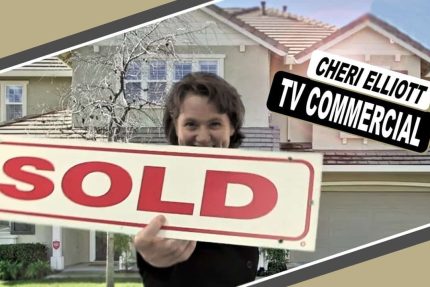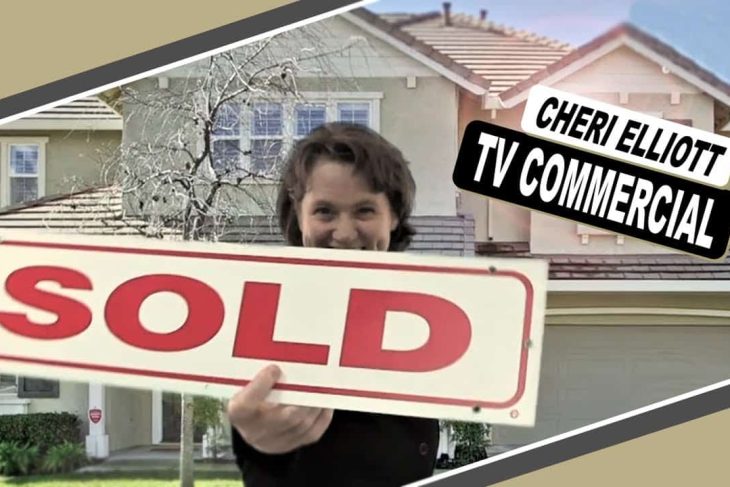
Becoming a Real Estate Photographer—Ultimate Guide + Tips
If you’re trying to figure out how to become a real estate photographer, you’re in the right place. It’s a niche with serious demand, and the barrier to entry is lower than you might think. With the right skills, gear, and a bit of hustle, […]
Marketing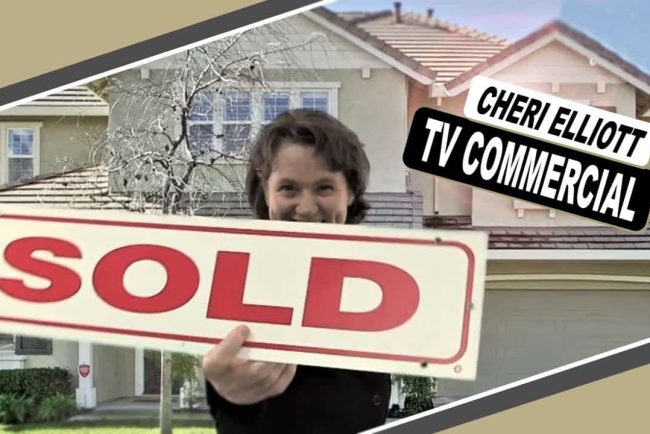
The Ultimate Real Estate Listing Marketing Plan (PDF Checklist)
Your listing marketing plan is one of the most powerful tools you have as a seller’s agent. It maps out exactly where, how, why, and when you’ll promote your client’s home. If you haven’t created one yet, I’m sharing our 10-point Ultimate Real Estate Listing […]
Marketing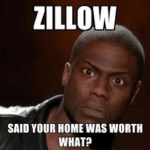
Zillow Estimates Ultimate Guide: What Is It & How Accurate Is It?
The Zestimate is Zillow’s automated home valuation tool. It uses public data, MLS records, and proprietary algorithms to instantly estimate a property’s market value, with no agent or signup required. It’s one of the most widely used pricing tools in real estate, but also perhaps […]
Marketing
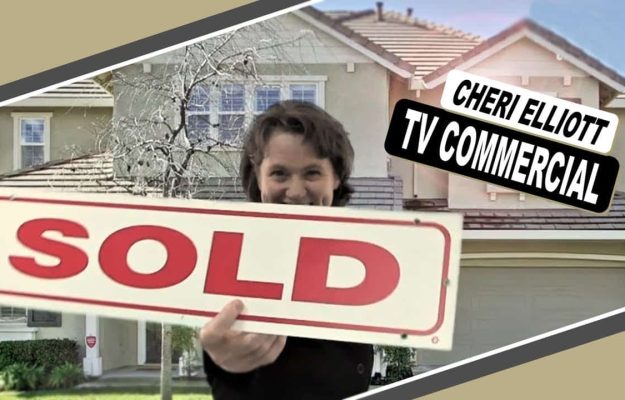
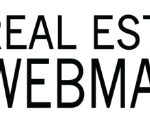

Becoming a Real Estate Photographer—Ultimate Guide + Tips
If you’re trying to figure out how to become a real estate photographer, you’re in the right place. It’s a niche with serious demand, and the barrier to entry is lower than you might think. With the right skills, gear, and a bit of hustle, […]
MarketingIf you’re trying to figure out how to become a real estate photographer, you’re in the right place. It’s a niche with serious demand, and the barrier to entry is lower than you might think. With the right skills, gear, and a bit of hustle, you can turn this into a profitable side gig — or even a full-time career! My guide will teach you how to break in, stand out, and actually make it work.
What exactly does a real estate photographer do?
A great real estate photographer knows how to read the room (literally), control light, compose the right angles, and edit in a way that flatters without faking. Their work isn’t just about pretty pictures; it’s a key part of real estate marketing. High-quality photos help listings stand out and build trust with buyers.
Here’s what the job involves beyond all the shutter clicks:
- Scouting spaces and planning the shots based on layout, lighting, and key features
- Staging or adjusting scenes, even small things like curtains and pillows, to clean up clutter
- Making good use of natural and artificial lighting to balance brightness and eliminate harsh shadows
- Shooting wide without distortion using the right lenses and camera height for each room
- Editing for clarity — correcting exposure, white balance, perspective, and saturation
- Keeping track of files and backups (using SD cards, organized folders, and cloud storage is a must!)
- Maintaining all gears like lenses, tripods, lighting, spare batteries, chargers, and even microfiber cloths
- Delivering clean, high-resolution images optimized for the multiple listing service (MLS), real estate sites, and social media
How to become a real estate photographer
Now that you’ve got a clear picture of the job, let’s talk about how to make it happen! Below, I’ve laid out the most essential steps, gear tips, and business moves that’ll help you get started the right way.
Step 1: Study photography basics
If you want to avoid bad real estate photos, you’ve gotta start with the fundamentals. Discover how light works, learn to expose a room correctly, and master the art of composing your shots to create a space that feels balanced and inviting.

You don’t need a fancy setup to get started. If you’re still learning, even your phone can be a solid practice tool! Focus on getting comfortable with light, shadows, and framing, then work your way up. If you’re wondering how to get into real estate photography, it starts with your eye and shooting a lot, even if it’s just your living room for now.

Pro tip: If you know someone willing to lend you a DSLR or mirrorless camera, take advantage of it. The more you shoot, the faster you’ll level up.
Step 2: Invest in the right gear — without overspending!
You don’t need to drop thousands of dollars to start shooting real estate properties. A good entry-level camera, a wide-angle lens, and a sturdy tripod will get the job done.
What matters more than buying the most expensive gear is knowing how to use it and choosing tools that fit the kind of work you want to do. Start small, learn as you go, and upgrade when you begin to land more clients or feel limited by your current setup.
If you’re ready to start building your kit, I’ve pulled together a list of beginner-friendly gear that’s solid, affordable, and totally capable of producing pro-looking real estate photos:
| Gear | Description | Best for | Starting price |
|---|---|---|---|
| Nikon Z50 with a 16-50mm wide-angle zoom lens | Compact and great in low light, with excellent color accuracy | Beginners who want a mirrorless camera’s flexibility | $897 (with kit lens) |
| Get the Nikon Z50 from Amazon | |||
| Sony a6400 with a 16-50mm lens | Fast autofocus and strong video features, also great for handheld shooting | Hybrid shooters doing both photos and video | $929 (with kit lens) |
| Get the Sony a6400 from Amazon | |||
| Nikon Z 40mm f/2 lens (Nikon Z mirrorless mount) | Small and bright; slightly tighter than the 35mm | Lifestyle shots, decor details, and clean compositions | $227 |
| Get the Nikon Z 40mm f/2 from Amazon | |||
| Sigma 30mm f/1.4 DC DN lens (Sony E mount) | Affordable, great low-light prime lens for crop-sensor mirrorless cameras | Budget-friendly option for entry-level real estate work | $379 |
| Get the Sigma 30mm f/1.4 from Amazon | |||
| Manfrotto Element MII Aluminum Tripod | Lightweight aluminum tripod with a ball head, compact enough for travel but sturdy for real estate setups | Steady interior shots, long exposures, and twilight shoots | $109 |
| Get the Manfrotto Element MII from Amazon | |||
| Peak Design Travel Tripod (Aluminum) | Folds down small, quick setup, solid stability | On-the-go shoots where portability matters | $360 |
| Get the Peak Design Travel Tripod from Amazon | |||

Pro tip: If you’re not quite ready to commit to buying everything brand new, consider renting gear or purchasing used items. Many photographers start with secondhand cameras and lenses in great condition. It’s a smart way to learn what works for you without burning through your budget early on.
Step 3: Build a killer starter portfolio
Before clients will trust you with their property listings, they’ll want to see what kind of results you can deliver, even if you’re just getting started.
Offer to shoot a few homes for free or at a discount to build up your sample work. Aim for variety if possible: residential interiors, commercial or architectural spaces, and perhaps even an exterior shot around sunset. This is your chance to show range and creativity.
Once you’ve got several solid shoots under your belt, create a simple portfolio site to showcase them. Platforms like Squarespace, Wix, and Format all offer beautiful templates specifically designed for photographers. Plus, they’re super easy to update as you grow. Your site doesn’t need to be fancy, but it should be clean and easy to navigate.
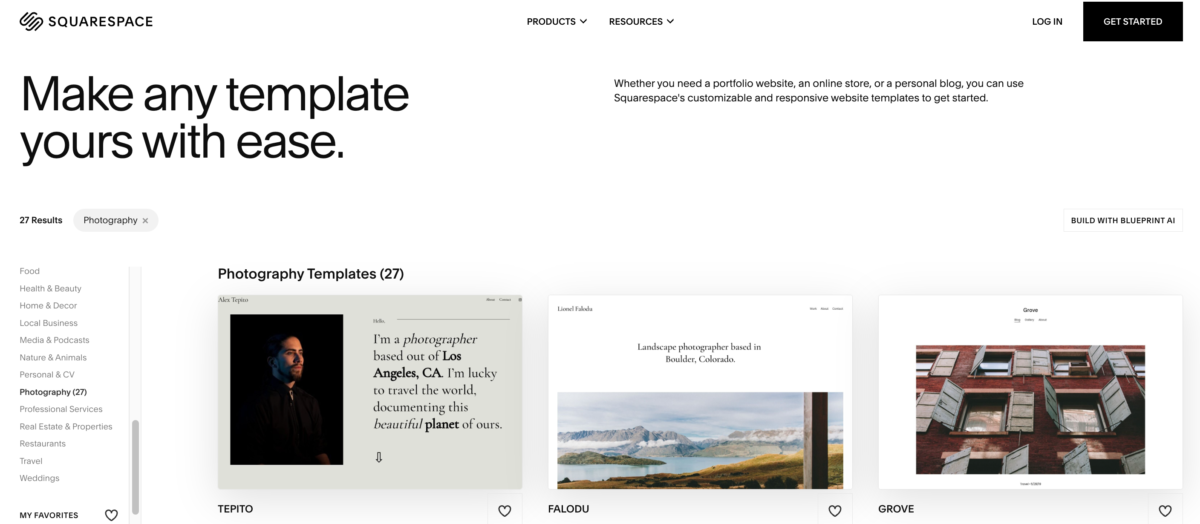
Step 4: Learn to edit photos like a pro
Even the best photos need a little polish. Editing helps balance exposure, correct color issues, and make your photos look clean and consistent, especially when working with challenging lighting or shooting bracketed exposures. Most real estate photographers use tools like Lightroom or Photoshop, but you don’t have to master everything overnight.
If editing feels overwhelming or you’re just too busy to dive deep, that’s totally fine! You can always outsource your edits to a freelancer who specializes in real estate photography. Sites like Fiverr are full of pros who can take your raw files and turn them into clean, MLS-ready images for a reasonable price. It’s a great way to save time and still deliver polished work your clients will love.
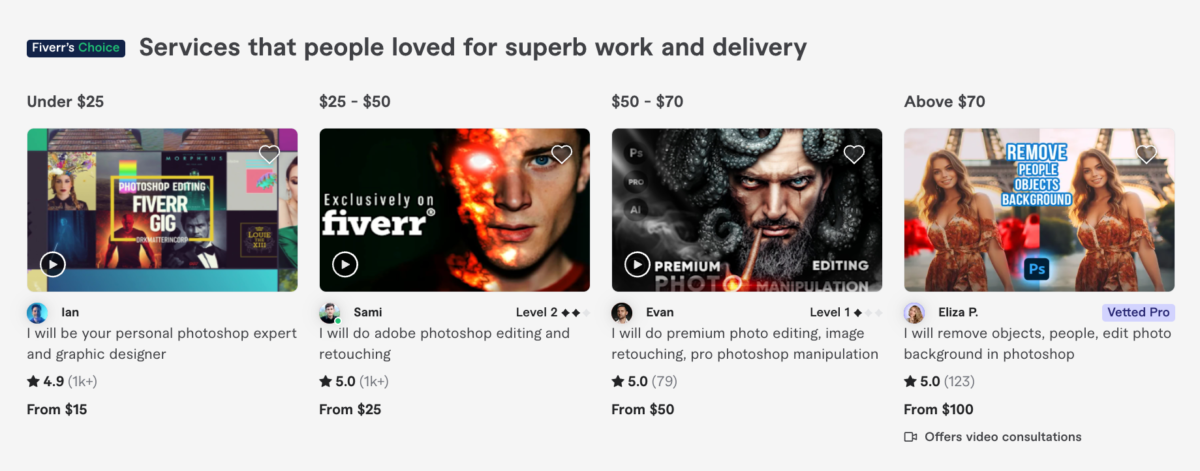
Step 5: Set your rates (and don’t be shy about your value)
Pricing can feel awkward when you’re new, but here’s the truth: great photos help agents sell faster, and that is worth real money. Instead of guessing or charging whatever you think someone will pay, think about the value you’re offering. Then, factor in your time, travel, editing hours (if any), gear upkeep, and delivery process — not just the hours you spend during the shoot.
Not sure where to start? Examine local competitors in your market and create a few simple packages tailored to home size or services. Remember to charge fairly, stay consistent, and raise your rates as your experience and confidence grow.
Real Estate Photography Pricing, Types & Hiring Tips Guide
Step 6: Network, market your services, and start landing clients
The most effective way to find clients is by establishing genuine, local connections. Reach out to a few real estate agents, property managers, stagers, or even Airbnb hosts. Offer to shoot their property at a discount or for free in exchange for portfolio use and a testimonial.
Then, start sharing your work on social media. Post before-and-after edits, cool angles, or a slideshow of your best shots. After all, one good client relationship can lead to a steady stream of referrals. Who knows? Your client’s whole brokerage might just hire you as a full-time real estate photographer!
Bonus skills to set you apart
Once you’ve nailed the basics, there are a few extra skills that can level up your game and make you the photographer real estate agents remember. These aren’t must-have skills when you’re starting, but they can open doors to bigger listings, higher rates, and repeat clients.
If you’re ready to go beyond the standard shots, here’s where you can shine:
Drone and aerial photography
Aerial shots are ideal for listings with large lots, expansive backyards, or distinctive surroundings, as they provide buyers with a comprehensive view of the property in one frame. You’ll need to be FAA-certified to fly commercially in the U.S., but once you’ve got the license, the value you bring goes way up.

Some agents specifically look for photographers who offer drone work because it instantly elevates a listing. Just make sure you’re flying safely, following local laws, and delivering high-res, well-composed drone images.
 Helpful resource: Of course, you’ll need to invest in a solid drone camera — we’ve put together a guide to real estate drone photography, including some top-rated models to check out.
Helpful resource: Of course, you’ll need to invest in a solid drone camera — we’ve put together a guide to real estate drone photography, including some top-rated models to check out.Twilight photography
Twilight shots give homes a warm, inviting glow, especially when the interior lights are on and the sky reaches that perfect post-sunset blue. They take more planning and timing, but they make a huge visual impact. Agents love them for luxury listings or to help a property stand out on the MLS.

If you want to start mastering twilight photography, try shooting homes during that golden 20 to 30-minute window after sunset. Bring a tripod, dial in your exposure and shutter speed, and take your time blending for clean, balanced results.
Virtual staging and floor plans
Sometimes, a space is empty or just not that photogenic — and that’s where virtual staging comes in! With the right software, you can digitally furnish a room to help buyers visualize what it could look and feel like. The same applies to floor plans: clean, simple layouts help buyers mentally visualize the space before they visit.
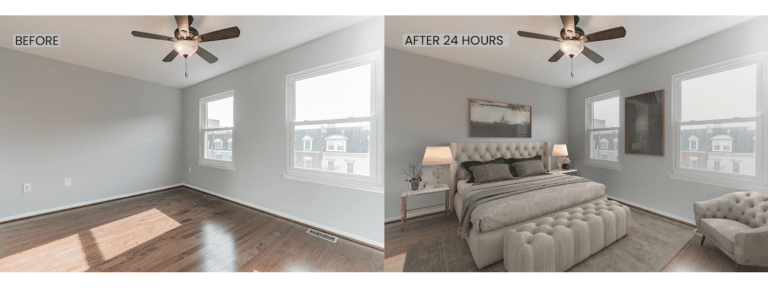
You don’t have to be a designer to offer these services, but knowing how to outsource or utilize basic tools effectively can give your portfolio a significant edge. If you want to explore how virtual staging works and which software to try, check out our complete guide to virtual staging for real estate.
Real estate photography tips to grow your business faster
The next step? Building momentum and securing numerous clients. These real estate photography tips are all about helping you grow smarter, without feeling like you’re winging it every time. Minor improvements in how you shoot, communicate, and deliver can make a big difference in how clients see your work.
- Always stick to fast turnaround times. A 24- to 48-hour window for delivering edited photos keeps agents happy and encourages them to return.
- Offer simple package options with add-ons. Make it easy for clients to book you by offering a few clear packages, then let them upgrade with extras like drone shots, twilight photos, or virtual staging. People love options, but not decision fatigue.
- Follow up after each job (and ask for a testimonial!). A quick thank-you email after each delivery, accompanied by a gentle request for a review or referral, can lead to more work down the line.
- Stay active on social media and keep on sharing your work! It doesn’t matter if you only maintain your Instagram and TikTok accounts; you have to be consistent in posting. You never know which agent, homeowner, or builder is scrolling and looking for someone just like you.
Frequently asked questions (FAQs)
What qualifications do you need to be a photographer?
You don’t need a formal degree to become a real estate photographer. Many professionals are self-taught or have learned through workshops and online courses. What’s most important is building a solid portfolio and continuously honing your photography skills.
How much do real estate photographers make?
Real estate photographers’ earnings depend on their experience, the services they offer, and the location of the property. According to ZipRecruiter, real estate photographers earn an average annual salary of $62,338. Other top professionals, especially those offering premium services, typically earn more.
What is the highest-paying photography job?
Commercial photography often tops the list, usually when working with major brands or in the advertising industry. Specializations like fashion and luxury real estate photography can also be quite lucrative. The highest-paid photographers know how to combine their technical skills with a strong client network.
Your take
Ready to snap your first real estate photography job? If you’ve made it this far, you’re already ahead of most beginners. The important thing is to keep shooting, keep learning, and keep putting yourself out there. Real estate photography is one of those fields where the more you do it, the better you get. Do you have any questions? Let me know in the comments!
The post Becoming a Real Estate Photographer—Ultimate Guide + Tips appeared first on The Close.

The Ultimate Real Estate Listing Marketing Plan (PDF Checklist)
Your listing marketing plan is one of the most powerful tools you have as a seller’s agent. It maps out exactly where, how, why, and when you’ll promote your client’s home. If you haven’t created one yet, I’m sharing our 10-point Ultimate Real Estate Listing […]
MarketingYour listing marketing plan is one of the most powerful tools you have as a seller’s agent. It maps out exactly where, how, why, and when you’ll promote your client’s home. If you haven’t created one yet, I’m sharing our 10-point Ultimate Real Estate Listing Marketing Plan to help you look like a rock star in your listing presentations. With it, you can confidently list any property — including luxury ones — and convince every seller that you’re the agent to get their property sold.
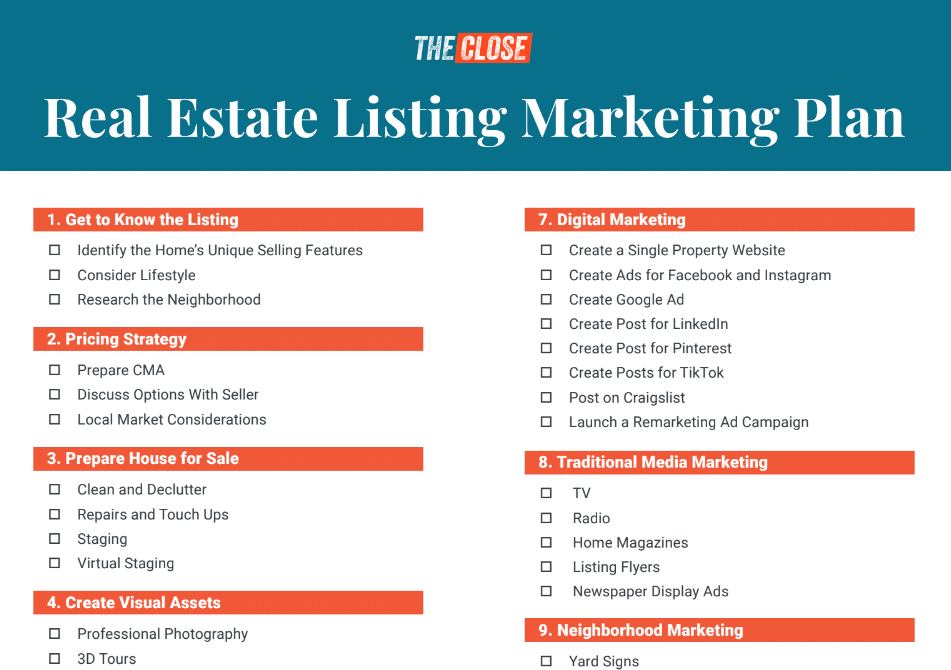
1. Understand every feature, flaw, & selling point of the property
You can’t market a home you barely know. Before you even think about writing the listing or creating your real estate marketing plan, you’ve got to know the home like the back of your hand. What makes it shine? What quirks might raise eyebrows?
- Identify the home’s unique selling features: Talk to your seller and get specific about the spaces they’ve enjoyed the most. Features like a remodelled kitchen or custom built-ins can set the tone when you start writing creative listing descriptions.
- Consider how the property fits a buyer’s lifestyle: Is this home ideal for remote workers, growing families, or downsizing retirees? Use location and amenities to frame the home in a way that speaks directly to the people who’ll see the most value in it.
- Research the neighborhood: Dig into local highlights like nearby employers, schools, transit access, airports, and development plans. However, be mindful to comply with all fair housing laws when interacting with your clients.
2. Develop a data-driven pricing strategy
- Prepare a detailed CMA: The comparative market analysis (CMA) is one of the best tools in your real estate listing marketing plan because it gives you and your clients tangible data to base pricing on. Get a baseline of value for the listing, then discuss options for pricing above or below market value.

- Discuss options with the seller: Break down the impact of each approach, such as going slightly above market, pricing at value, or dipping just below to spark interest. Be clear about what each move might mean in terms of showings, buyer urgency, and days on market.
- Layer in current market considerations: Research days on market, current pricing, new construction, mortgage interest rates, and changes in the community. These details can significantly influence buyer behavior and should inform how you market the home from the outset.
3. Prepare the house for sale by maximizing its appeal
- Clean and declutter: Guide your sellers on what to pack away, especially anything overly personal. Once the space is clear, bring in pros for a deep clean to make the home feel fresh and move-in ready.
- Handle minor repairs and touch-ups: Recommend changes that offer a visual impact without incurring significant costs. Be honest about what’s worth fixing and what might not be worth the investment.
- Boost curb appeal: From planting fresh flowers to power washing the front walk, minor updates can make a big first impression. If the exterior still requires improvement, consider adding visual enhancements to elevate it further.
- Use staging to bring the space to life: If the house is vacant or the decor is subpar, consider staging your listing or hiring a professional staging company to add context to empty or not-so-appealing spaces. Staging is a must-have in your real estate listing marketing plan for luxury homes in particular.
- Offer virtual staging when needed: If traditional staging isn’t in the budget, an alternative is virtual staging, which can also be done for vacant or furnished homes. Use a professional company like Apply Design to give your vacant listing a stunning makeover.

4. Create and collect high-quality visual assets
Strong visuals are non-negotiable. Buyers are scrolling through dozens of listings, and your photos and videos need to stop the scroll. Here are a few must-haves to build out your visual real estate listing checklist:
- Professional photography: Bring in a real estate photographer to create stunning images that showcase the best angles and lighting. If you’re shooting it yourself, brush up on photo composition, lighting, and some editing basics. Check out our real estate photography guide for some tips for stunning listings.
- 3D Tours: Invest in 3D virtual tours to provide buyers with an interactive tour experience. Using software like Matterport will ensure that you’re able to create a stellar experience for potential buyers. Visit Matterport to learn more about it, or check our best virtual tour software guide for more options.
- Promo videos and virtual tours: Shoot short vertical videos with music and text overlays for Instagram Reels, TikTok, or YouTube Shorts. Simple walkthroughs shot on your phone can perform surprisingly well.
- Aerial photography and video: Use drone shots to capture a broader view of the property, neighborhood, and surroundings. This is particularly helpful if the home is located near key landmarks, such as the beach, a golf course, or a university.
5. Create a listing & post everywhere
Your listing deserves maximum exposure, and that means showing up everywhere buyers are looking — locally, regionally, and online. From your property description to syndication, every detail matters. Here’s how to get it out in front of the right audience:
- Write a compelling property description: Focus on the lifestyle the home offers using descriptive real estate words that help buyers picture themselves living there.
- Upload to your local multiple listing service (MLS): Post your listing on your local MLS with images from your pro photographer. Details matter, so double-check every field before hitting publish.
- Feature it on your brokerage and personal websites: If you have a website, prominently feature the listing on the homepage with a strong call to action to generate inquiries.
- List it on nearby MLSs: For homes near city or county borders, posting to multiple MLSs can expand visibility.
- Syndicate to major listing platforms: Include permission for your listing to be syndicated to other sites like Zillow, Trulia, and Realtor.com for broader reach.
- Prepare a listing book: Assemble a book that includes neighborhood amenities and community insights. Add more in-depth information about your listing and make the book attractive. It’s a great tool to leave out during showings or open houses.
6. Host open houses
Open houses can create buzz and bring in serious buyers when done right. Whether you’re drawing a weekend crowd or offering a more private experience, the key is creating a smooth showing and following up with purpose.
- Kick things off with a traditional open house: Plan a well-promoted event that feels like a grand opening. Coordinate timing with your seller, have the home spotless, and use a tool like Curb Hero to collect visitor info.

- Offer a virtual option for remote buyers: Schedule a virtual open house through platforms like Facebook or Instagram Live and invite attendees from outside the local area.
- Host by-appointment-only showings when needed: If the seller prefers more control or privacy, set time blocks for individual buyers. This gives you space to engage more and guide the experience.
- Follow up with open house attendees: Reach out to them soon after the event to thank them, solicit their feedback, and address any questions they may have. Personal follow-ups help turn casual interest into potential offers.
7. Leverage digital marketing channels
Digital marketing is all about showing up in the right places, with the right message, for the right audience. Develop a strategic approach that leverages both organic reach and targeted advertising.
- Create a single-property website: Use Canva for a quick, low-cost site or explore luxury-focused platforms like Sierra Interactive for something more elevated. Don’t forget to include lead capture forms to turn traffic into inquiries.
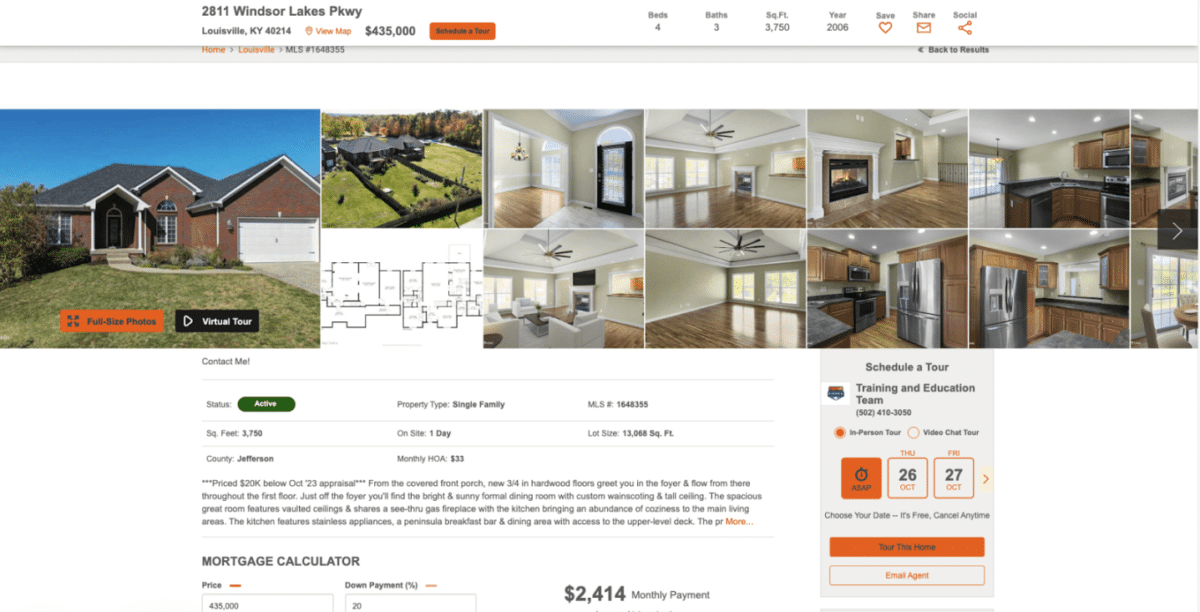
- Run real estate ads on social platforms: Use Meta Business to promote your listing across Facebook and Instagram. Create your ads, set your budget, and you’re all set.
- Post in real estate Facebook groups and Marketplace: Listings shared in local or niche groups can drive organic interest, especially when paired with eye-catching visuals.
- Tap into Google Ads for high-intent traffic: Whether through your setup or tools like Real Geeks or Sierra Interactive, Google’s targeting power helps you reach buyers actively searching in your market.
- Showcase your expertise on LinkedIn: Use this platform to promote investment opportunities or demonstrate your local market knowledge to your professional network..
- Create scroll-stopping visuals for Pinterest and Instagram: Pin or post listing photos and link directly to your lead capture pages. These platforms are perfect for visual-first engagement.
- Show some personality on TikTok: A quick video (set to trending audio) of a unique listing feature — a swimming pool, gourmet kitchen, or a sunset from the deck — can reach a whole new audience.
- Post on Craigslist: You may not think of Craigslist when you start mapping out your marketing strategy, but don’t discount how many eyeballs you can capture on the platform for your listing.
- Launch remarketing campaigns: One of the most effective strategies for efficient digital marketing is remarketing, which reengages your existing customers through targeted email or paid ads. You can do this through your Google Ads account.
8. Utilize traditional media outlets
Digital marketing might get most of the buzz, but traditional media still has its place. From print to radio, these outlets can add reach and credibility to your listing campaign:
- Run local TV ads: Use the power of TV advertising to reach your audience who doesn’t spend all their time on their phones. Depending on your target demographic, TV ads may produce powerful results and are a great asset to your overall listing marketing plan.
- Place radio spots with broad community reach: Consider sponsoring segments or running short promos on popular radio stations in your area. Think about tying it to your brokerage branding.
- Advertise in regional or luxury home magazines: These glossy spreads often land in the hands of serious buyers. Plus, sellers love seeing their home in print.
- Print real estate flyers with CTAs: Design high-quality flyers for your listing that highlight the features, along with a QR code for more information.
- Use newspaper display ads for extra visibility: Local newspapers still draw attention. Sellers love seeing their listings in print. And newspapers have digital display ads online, too!
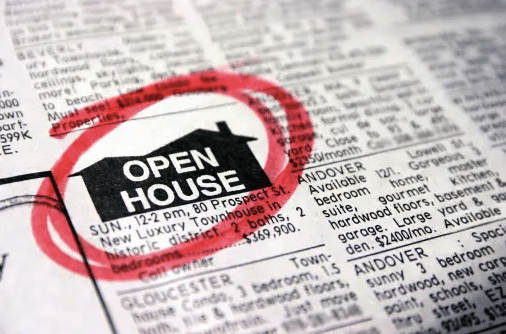
9. Implement targeted neighborhood marketing
Don’t overlook the power of local buzz. Clever neighborhood marketing can increase foot traffic, spark word-of-mouth referrals, and show nearby homeowners that you’re the go-to agent in their area. It’s old school, but still incredibly effective when done right.
- Use high-quality yard signs: As part of your real estate marketing listing checklist, ensure your yard signs are in excellent condition and represent your image professionally.
- Add QR codes for easy digital access: Link directly to your listing site or virtual tour. Create sleek, branded codes using tools like Canva.
- Try geo-targeted ads around the property: Use a geofencing marketing company to advertise to those who come within the perimeter of your property.
- Branded directional signs: Invest in branded directional signs to stand out and attract more buyers to your open house.
- Postcards and door hangers: Use a company like ProspectsPLUS to create marketing postcards for your listing and send them out with just a few clicks.
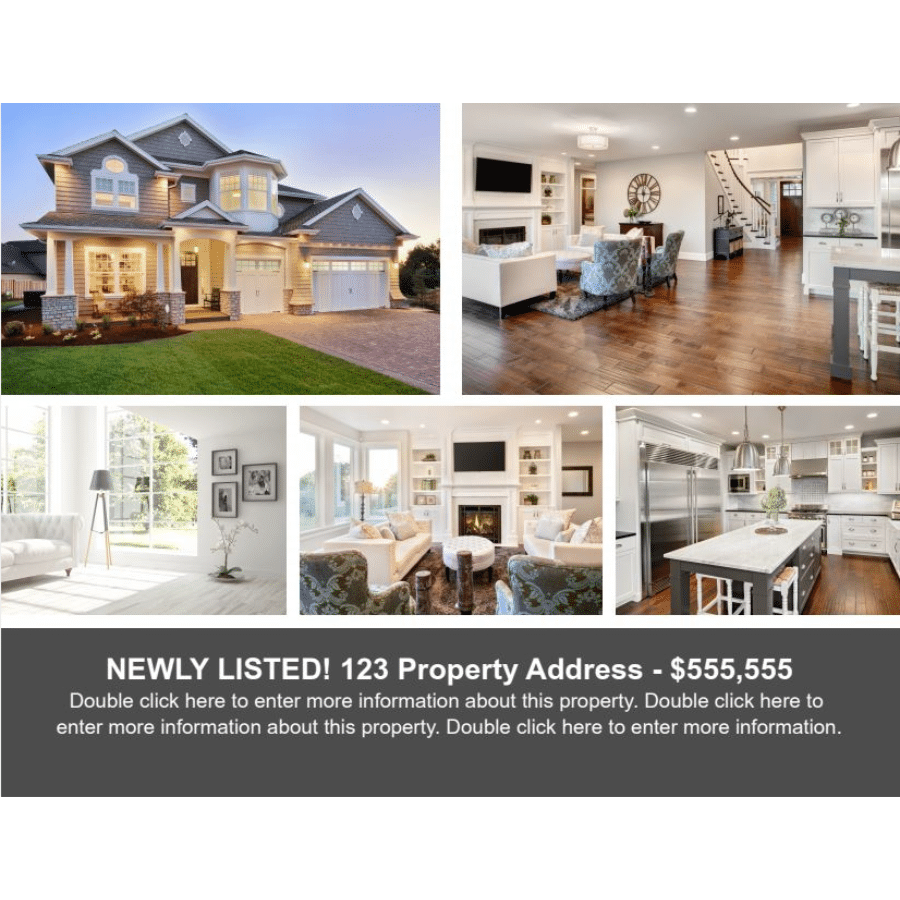
- Generate more leads through circle prospecting: Get out and knock on doors around your open house to encourage people to visit. “Lookie-loo” neighbors sometimes bring referrals, so make nice with them.
10. Market to your sphere of influence
Your personal network is one of your strongest marketing tools. Past clients, colleagues, fellow agents, and community contacts can help spread the word and offer feedback. Don’t be shy — always keep your circle in the loop.
- Start with your office: Spread the word about your listing to everyone you already work with. They may have a buyer who is the perfect fit.
- Market to outside agents and brokerages: Post in industry Facebook groups, message boards, or agent networks where peers gather and share inventory.
- Send a dedicated email blast to your sphere: Whether it’s a one-time send or part of your regular newsletter, ensure your contacts hear about the listing.
- Loop in local businesses: Reach out to small business owners and community partners who might help spread the word.
- List on a broker tour or caravan: Showcase your listing through your local broker tour. Create feedback forms for agents to share their thoughts on how you can improve your listing.
- Update your seller client weekly: Even if there’s nothing new to report, consistent communication is vital for a solid working relationship.
Bonus: Apply specialized strategies for marketing luxury listings
Luxury listings call for a higher level of presentation and promotion. Everything, from your branding to your materials, should reflect the premium experience buyers expect at this level.
- Polish your brand: If you’re breaking into the luxury market, you’ll want to make sure your brand is ultra-high-quality. Everything from your logo to listing materials should signal quality, exclusivity, and attention to detail.
- Invest in a custom video: Hire a pro to create a cinematic property tour with aerial shots and voiceover narration.
- Level up your real estate brochure game: Skip the one-pagers. Go for thick, high-gloss cardstock and multi-page layouts that feel like mini coffee table books.
- Market beyond your ZIP code: List nationally and internationally to attract vacation home buyers and home investors. Reach out to agents in other luxury markets who might have interested clients.
- Host a high-end broker’s open: Invite top agents who have worked similar price points, serve upscale food and drinks, and consider small gifts as thank-yous.
Frequently asked questions (FAQs)
How to create a marketing plan for real estate?
Start by thoroughly understanding the property inside and out, then develop a comprehensive plan that includes a pricing strategy, effective staging, high-quality visuals, and a distribution strategy across both digital and traditional channels. Remember to tailor your approach to the specific type of property, target buyer, and prevailing market conditions.
How do I market my listings?
Use a mix of professional photos, videos, single-property sites, social media, email marketing, and open houses. The key is showing up consistently where buyers are already looking.
How do I get my listings noticed?
Excellent visuals and targeted marketing make all the difference. Promote across multiple channels, write compelling descriptions, and don’t forget to tap into your sphere and agent network to spread the word.
Bringing it all together
In the current market, learning how to put a real estate marketing plan for sellers together and execute it will make a big difference in your level of success. What strategies do you use in your real estate listing marketing plan? Let me know in the comments!
The post The Ultimate Real Estate Listing Marketing Plan (PDF Checklist) appeared first on The Close.

Zillow Estimates Ultimate Guide: What Is It & How Accurate Is It?
The Zestimate is Zillow’s automated home valuation tool. It uses public data, MLS records, and proprietary algorithms to instantly estimate a property’s market value, with no agent or signup required. It’s one of the most widely used pricing tools in real estate, but also perhaps […]
MarketingThe Zestimate is Zillow’s automated home valuation tool. It uses public data, MLS records, and proprietary algorithms to instantly estimate a property’s market value, with no agent or signup required. It’s one of the most widely used pricing tools in real estate, but also perhaps the most misunderstood. That’s why so many clients ask: “How accurate is a Zestimate?”
Zestimate can get pretty close to actual values, but it’s not 100% accurate. However, real estate professionals can use the platform as a helpful entry point for pricing discussions, setting expectations, and educating buyers and sellers about how home value is really determined.
Key Takeaways:
- Zillow uses proprietary technology to estimate a home’s market value.
- The nationwide median error rate for on-market homes is 1.94%, and that of off-market homes is 7.06%.
- On-market data is based on listing price, description, comparable homes in the area, and days on the market.
- Tax assessments, prior sales, and other publicly available records determine off-market data.
How Zestimate works and gets its data
The Zestimate is a home valuation based on a sophisticated algorithm that considers many factors and data points and is delivered in real-time for both on- and off-market properties. However, it’s not the same as a professional appraisal conducted in person by a licensed expert.
In-person evaluations take into account things an algorithm can’t, such as the home’s actual condition, upgrades, layout quirks, or neighborhood appeal. Naturally, those tend to be more accurate.
How is a Zestimate calculated?
A property’s Zestimate is calculated by complex software using an “automated valuation model” that analyzes data points collected from users, public records, and multiple listing services. According to Zillow, here’s what goes into that equation:
- Home features: Number of bedrooms and bathrooms, garage size, and other key attributes
- Physical characteristics: Square footage, lot size, home type, year built, and more
- Tax assessments and prior sales: Property tax records and transaction history
- Comparable sales: Recent sales of similar homes in the area
- MLS data: Including listing price, photos, listing descriptions, and days on market (for active listings)
- User-submitted information: Such as reported upgrades or renovations
- Public data: Including county records and permits
- Market trends: Seasonal and geographic pricing shifts
Zillow updates the Zestimate daily for millions of homes, and the model is constantly refined to improve accuracy. For example, listing price wasn’t always a factor, but now it’s a key data point for on-market homes. Additionally, not all MLSs participate in Zillow’s massive data collection. This results in a much more limited data set, further skewing a Zestimate, so understanding your MLS’s relationship with Zillow is also important.
Variations to consider
- On-market: Zestimates are based on listing price, description, comparable homes in the area, and days on the market.
- Off-market: Zestimates are determined by tax assessments, prior sales, and other publicly available records.
- Geographical: State-by-state data varies in accuracy.
Planned communities: They tend to have more accurate Zestimates because the properties are much more homogeneous, making it easier to calculate accurate comps.
How accurate is Zillow Zestimates?
There is often a debate about the accuracy of the Zillow Zestimate, and we’ve all seen the jokes. But as much as some real estate agents claim the Zestimate is completely inaccurate, it’s not that cut-and-dry.
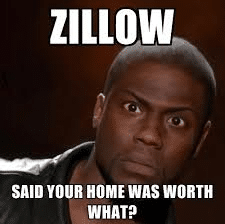
According to Zillow, there is a method to the madness regarding the Zestimate, which is a “nationwide median error rate.” For on-market homes, the error rate is 1.94%, and for off-market homes, it’s at 7.06%. The table below illustrates how close the Zestimate comes to actual sale prices using hypothetical home prices ($200K, $500K, $1M) to show what 5%, 10%, and 20% margins look like in dollar terms.
| Sales Price | 5% Range | 10% Range | 20% Range |
|---|---|---|---|
| $200,000 | ± $10,000 | ± $20,000 | ± $40,000 |
| $500,000 | ± $25,000 | ± $50,000 | ± $100,000 |
| $1,000,000 | ± $50,000 | ± $100,000 | ± $200,000 |
| Zestimate Accuracy | 82/100 properties have a Zestimate within 5%. | 95/100 properties have a Zestimate within 10%. | 99/100 properties have a Zestimate within 20%. |
| *Data compiled from Zillow Zestimates nationwide median data (March 2025) | |||
Today, the vast majority of Zestimates fall within 10% of the sale price, and only 1% of homes are off by more than 20%. Still, when you’re buying or selling a home, even a 5% swing can mean tens of thousands of dollars, so it’s smart to treat the Zestimate as a ballpark estimate, not a final answer.
Why Zestimates isn’t 100% accurate
Zestimate accuracy can fluctuate depending on the data Zillow has access to. The listings on Zillow get updated when information is publicly available. So, for instance, if a homeowner renovates but those changes aren’t reflected in public records, the Zestimate may undervalue the property. On the other hand, homes listed on the MLS usually have more complete data, leading to more accurate estimates.
In other words, the Zestimate is best used as a reference point, not a final valuation! Where Zillow shines is in the on-market Zestimates, which are based on the list price data and are far more accurate than the off-market Zestimates.
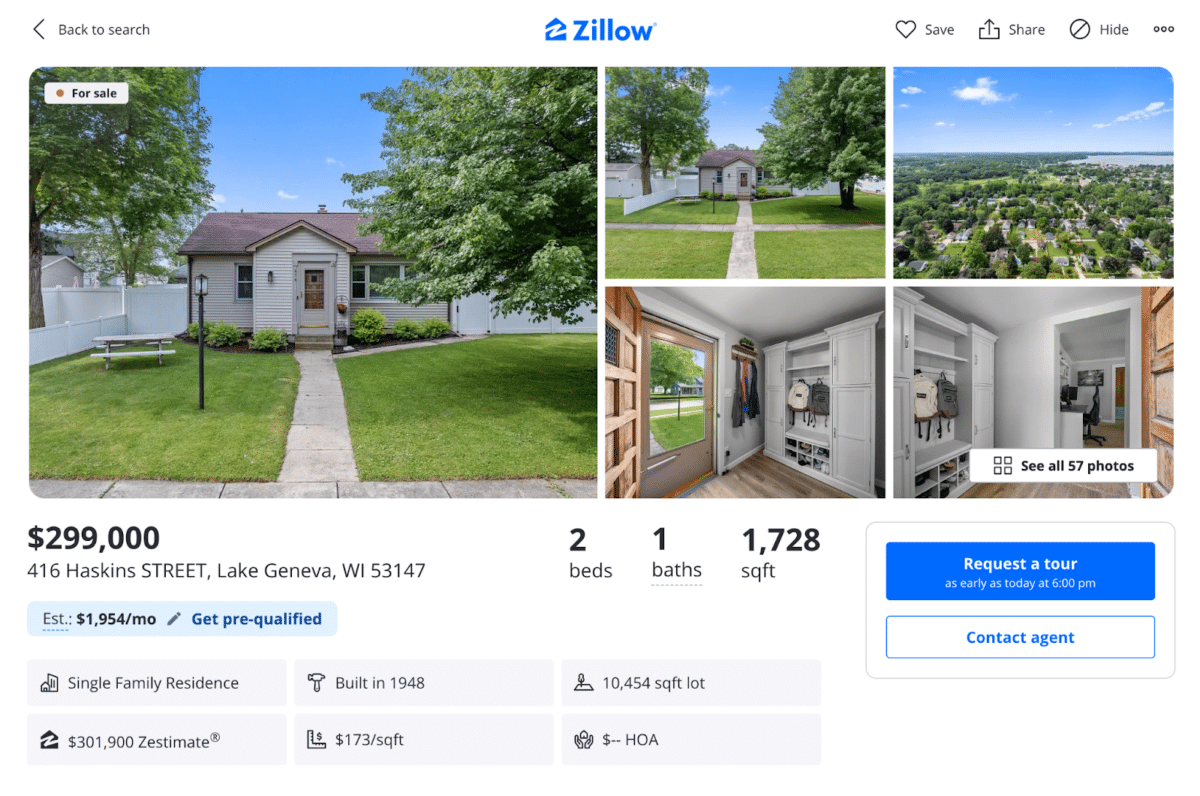
 Pro Tip
Pro Tip
Knowing how to do a comparative market analysis (CMA) is key to delivering accurate pricing and earning client trust. While a Zestimate can serve as a helpful starting point, a well-prepared CMA offers a clearer, more personalized view of a home’s true market value, and is often why a client chooses to work with a qualified agent.
Strategies for talking to clients about a Zestimate
The Zestimate has been around since 2006 and has become a familiar tool for buyers and sellers alike. Most clients now understand it’s not a final word on value, but questions like “Is Zillow accurate?” still come up often.
As a real estate professional, it’s important to be ready with clear, confident answers. Use the Zestimate as a conversation starter, then guide clients toward a deeper understanding of what really determines home value.

Sellers typically already have a perception of what they think their home is worth, often due to the Zestimate, so don’t avoid talking about it. Add a section to your listing appointment checklist that touches on the Zestimate, and use that time to explain it further.
Strategy 1: Use your data
When conducting your listing presentation, this is your chance to show why you are confident in your listing price. Walk the seller through your customized CMA and compare it to the Zestimate to help give the seller a complete picture of accurate pricing. This is a good time to explain how a Zestimate is calculated and why variances exist.

Pro tip: If you are getting a lot of pushback from the seller because their Zestimate is different from your suggested list price, offer to test the market with the Zestimate price as a pocket listing for a specific period of time.
Strategy 2: Apply your local expertise
You know your local community better than Zillow does. Use this expertise to illustrate how your price considers new zoning, a great new donut shop coming in around the corner, whether you’ll need flood insurance, or that buyers paid more for the neighbor’s house because it had a brand-new HVAC system.
You have the advantage of proximity. Remind your clients that when making giant financial life decisions, it’s OK to back away from a computer and rely on an actual human being.
Strategy 3: Show proof of the inaccuracies
To paint a full picture, it’s important to acknowledge and discuss the potential inaccuracies that can come with the Zestimate. Our clients hire us to help them sell their homes for the highest and best price in the fastest timeframe possible. Pull some examples of Zestimate inaccuracies and explain why that can happen. Remind your clients that a home is only worth what a buyer is willing to pay and that sold homes reflect that accurately.
Strategy 4: Practice with a script
Feeling comfortable having difficult conversations with clients comes with time and experience. If you’re unsure how to approach a discussion about the Zestimate, try this script.
I know you don’t want to undervalue your home, and online estimates, like Zestimates, can be attractive. But here’s the thing: those estimates don’t always reflect the local market or take into account your home’s unique value, and they can be misleading. My CMA is based on in-depth research of the local area, current market trends, and years of local expertise. It’s designed to help you price your home strategically so you can sell quickly and for the best possible price.
I know it’s hard to hear that your home might not match an online estimate, but my goal is to be your advocate and help you get the best outcome. I’m not trying to undervalue your home, but I want to make sure it’s priced right for this market.
Let’s review my CMA together and discuss a pricing strategy that positions your home for success. I’m confident we can agree on a price you’re comfortable with and that attracts serious buyers. Remember, the longer a home sits on the market, the harder it becomes to sell. Let’s work together to price it right from the start and get you moving forward.
<!–Copied to clipboard!–>
FAQs
Is Zestimate or Redfin more accurate?
There are conflicting answers online as to whether Zillow or Redfin has the more accurate home valuations. However, Redfin has reported a median error rate of 1.93% for on-market homes, making it ever-so-slightly more accurate than the Zillow Zestimate.
Can a seller change the Zestimate?
Yes, if a homeowner would like to influence the price shown on Zillow, they can do so by editing their home facts. Fixing any incorrect or incomplete information will help get the price as accurate as possible. Information such as architectural style, roof type, heat source, building amenities, and more can also be added.
What is the difference between a Zestimate and an appraisal?
A Zestimate is an automated estimate based on public data and algorithms. An appraisal is a formal valuation by a licensed professional who inspects the home in person. Zestimates are estimates, while appraisals tend to deliver a more accurate valuation figure.
Your take
While there are many reasons real estate agents don’t like battling the Zestimate, learning to use it as a tool can actually be beneficial.
- It’s a great conversation starter.
- You can leverage the Zestimate to show your expertise and further dive into the details of a CMA.
- It can be a door opener for new business.
- It can act as a bridge to have difficult conversations, including those about price reductions.
What do you think about Zillow Zestimates? How accurate has it been in your experience? Leave a comment below and let us know!
The post Zillow Estimates Ultimate Guide: What Is It & How Accurate Is It? appeared first on The Close.

30 Real Estate Thank You Notes: The Secret Weapon Some Agents Miss [+Templates]
Saying thank you may seem like a small gesture, but it can do more than express gratitude. It can open the door to your next deal and deepen relationships. It also contributes to your personal brand, highlighting your attention to detail and your commitment to […]
MarketingSaying thank you may seem like a small gesture, but it can do more than express gratitude. It can open the door to your next deal and deepen relationships. It also contributes to your personal brand, highlighting your attention to detail and your commitment to service, which are key qualities in an industry where trust and reliability are essential. A well-timed thank you also reminds clients and vendors why they chose you — and why they’ll choose you again.
Below, you’ll find The Close’s ready-to-use templates for just about every situation, from follow-ups to closing day celebrations. Whether you’re handwriting a card or sending a quick text or email, there’s a message here that fits. After the real estate thank-you notes, I’ll share tips on how to write your own and the ways to send them, as well as their importance.

Quick hits if you need something general ASAP 
In a rush? Here are some thank-you notes that work for almost any client. Just copy, tweak, and send!
-

Use case:
An SMS to a buyer or seller -

Tone:
Friendly and enthusiastic -

Delivery:
Text
- Great connecting today! I’m excited to help with your next step. Let me know if any questions pop up!
- Thank you again for your time! I’m here to support you whenever you’re ready.
- Appreciate the conversation today. Looking forward to what’s ahead!
- Just a quick note to say thanks. Let’s stay in touch as things move forward.
- Thanks for taking the time today! I’ll follow up soon with the next steps.
<!–Copied to clipboard!–>
-

Use case:
A follow-up with a buyer or seller -

Tone:
Warm and reassuring -

Delivery:
Text, email, or CRM (hence, the placeholders for automation)
- Appreciate your time, {{FirstName}}! I’ll follow up shortly with info that fits your goals. Let me know if anything else comes up.
- Hey there, {{FirstName}}. Thanks for the great chat today. I’ll be in touch with the next steps, but reach out anytime in the meantime!
- Great meeting you, {{FirstName}}! I’m here to help however I can. More soon!
- Hi, {{FirstName}}! Thanks again for reaching out! I’m looking forward to helping with your next chapter — more details coming soon.
- Thanks again, {{FirstName}}. Looking forward to working together and supporting your real estate journey.
<!–Copied to clipboard!–>
After initial contact with a lead 
-

Use case:
A friendly follow-up -

Tone:
Professional and welcoming -

Delivery:
Email or text
Hi there, [Lead’s First Name]!
It was great connecting with you earlier. I appreciate you taking the time to share a bit about your property [e.g., search / sale], and I’d love the opportunity to help guide you through the process.
I’ll follow up soon with a few ideas to get us started. In the meantime, feel free to reach out with any questions or if you want to talk more about your goals.
Looking forward to helping you with your next move!
Best,
[Your First Name]
[Your Title / Brokerage]
[Phone Number] | [Email]
<!–Copied to clipboard!–>
-

Use case:
A motivated lead -

Tone:
Encouraging and optimistic -

Delivery:
Text or email
Dear [Lead’s First Name],
Thank you again for sharing your goals with me. I can tell you’re focused and ready to move forward, and I’m excited to help make it happen.
I’ll be in touch soon with helpful information tailored to what we discussed. If you have any questions or would like to meet in person, just let me know. I’m looking forward to working together!
Looking forward to working together,
[Your Full Name]
[Your Title / Brokerage]
[Phone Number] | [Email]
<!–Copied to clipboard!–>
After a referral 
-

Use case:
A personal referral -

Tone:
Sincere and personal -

Delivery:
Text or handwritten card
Dear [Referrer’s Name],
I just wanted to say a heartfelt thank you for referring [Client’s Name] to me. It means a lot that you’d trust me with someone you know, especially in something as important as real estate.
I’ll be sure to take great care of them and keep you in the loop on how things progress. Referrals like yours are the best compliment I could ask for.
Gratefully,
[Your First Name]
[Phone Number] | [Email]
<!–Copied to clipboard!–>
-

Use case:
A professional referral -

Tone:
Appreciative and businesslike -

Delivery:
Email or text
Hello, [Referrer’s Name]!
I really appreciate you connecting me with [Client’s Name]. Thanks so much for thinking of me. I take referrals seriously, and I’ll ensure they feel fully supported throughout the process.
Let’s stay in touch! If there’s ever anything I can do to return the favor, don’t hesitate to reach out.
Best,
[Your Full Name]
[Phone Number] | [Email]
<!–Copied to clipboard!–>
After a listing appointment 
-

Use case:
A value recap -

Tone:
Clear and professional -

Delivery:
Email or printed note
Dear [Client’s First Name],
Thank you for taking the time to meet with me to discuss the potential sale of your property at [property address]. I enjoyed learning more about your goals, and I appreciate the opportunity to share how I can help you achieve them.
Based on our conversation, I’ll be preparing a detailed market analysis and customized plan to help you get the best possible outcome. I’ll follow up shortly with the next steps.
Please don’t hesitate to reach out if you have questions in the meantime. I’m here to help every step of the way.
Looking forward to working together,
[Your Full Name]
[Your Title / Brokerage]
[Phone Number] | [Email]
<!–Copied to clipboard!–>
-

Use case:
A reference to the client’s goal or timeline -

Tone:
Conversational and affirming -

Delivery:
Text or email
Hey there, [Client’s First Name]!
Thanks again for the great conversation today! I loved hearing about your plan to [e.g., move closer to family this fall / get your property on the market before summer ends], and I’m excited to help make that happen.
I’ll send over some next steps soon so that we can stay aligned with your timeline. Let me know if any questions come up in the meantime!
Talk soon,
[Your First Name]
<!–Copied to clipboard!–>
After a showing 
-

Use case:
A potential buyer -

Tone:
Helpful and upbeat -

Delivery:
Email or text
Hi, [Client’s First Name].
It was great meeting you at the open house for [property address]. I hope the space gave you a good feel for what you’re looking for.
If you have any questions about the home or want to see it again, I’d be happy to schedule a private showing or share more details. And if it’s not the one, I can help you find the right fit.
Thanks again for coming by!
Best,
[Your First Name]
[Phone Number] | [Email]
<!–Copied to clipboard!–>
-

Use case:
A seller, thanking them for hosting -

Tone:
Thankful and courteous -

Delivery:
Handwritten note or email
Dear [Seller’s First Name],
Thank you again for allowing me to host the open house at [property address]. Your property showed beautifully, and your efforts to keep everything welcoming and tidy truly made a difference.
I had strong turnout and positive feedback from attendees, and I’ll be following up with interested parties in the coming days. I’ll keep you updated on any developments.
It’s a pleasure working with you and helping showcase your property to its fullest potential.
Warm regards,
[Your Full Name]
[Your Title or Brokerage]
<!–Copied to clipboard!–>
After signing a representation agreement 
-

Use case:
A buyer signs a listing agreement -

Tone:
Excited and appreciative -

Delivery:
Email or handwritten card
Hi, [Client’s First Name]!
I’m excited to officially be your agent! Thanks so much for placing your trust in me. I’m looking forward to helping you find a great place and making this journey as smooth as possible.
Talk soon,
[Your Name]
<!–Copied to clipboard!–>
-

Use case:
A seller signs a listing agreement -

Tone:
Respectful and committed -

Delivery:
Email or handwritten note
Hey, [Client’s First Name]!
Thank you for choosing me to represent you in the sale of your property. I’m honored to be part of this important step, and I’ll work hard to make the process efficient and rewarding for you.
Warm regards,
[Your Name]
<!–Copied to clipboard!–>

Set a reminder to touch base in three days with a kickoff plan or listing checklist.
After a successful negotiation 
-

Use case:
Acknowledgment of the win -

Tone:
Celebratory and confident -

Delivery:
Email, text, or handwritten note
Hi, [Client’s First Name]!
Congratulations on securing [e.g., the sale price you wanted / amazing terms on your dream property]! It was a strong outcome, and I’m thrilled we were able to negotiate terms that worked in your favor.
Wins like this don’t happen by accident! You stayed focused, asked smart questions, and trusted the process. I’m so glad I could help you get across the finish line.
Onward to the next step! Let me know if you have any questions as we move forward.
Cheers,
[Your First Name]
<!–Copied to clipboard!–>
-

Use case:
Gratitude for trusting you -

Tone:
Grateful and reflective -

Delivery:
Text or email
Dear [Client’s First Name],
Just wanted to say how proud I am of how everything turned out. This one took some work, but I’m so glad we stuck with it and pushed through the tough moments together.
It was absolutely worth it to get the [e.g., closing terms / buyer concessions / final price] you were hoping for. Thanks for your trust and patience throughout — it made all the difference.
I’m here for anything you need as we move toward closing and beyond.
All the best,
[Your First Name]
<!–Copied to clipboard!–>
After closing 
-

Use case:
Giving thanks, accompanied or preceded by a gift -

Tone:
Joyful and thankful -

Delivery:
Handwritten card, text, or email
Dear [Client’s First Name],
Congratulations again on closing! It’s been such a joy to help you [buy/sell] your [property type], and I’m thrilled you’re starting this new chapter.
As a small token of appreciation, I’ve sent over a [e.g., welcome basket / personalized charcuterie board / gift card to a local restaurant]. I hope it helps you celebrate even more.
Thank you for trusting me with this journey. I’m always just a call or text away if you ever need anything real estate-related (or just want to say hi!).
All the best,
[Your First Name]
<!–Copied to clipboard!–>
-

Use case:
Building a long-term relationship -

Tone:
Caring and appreciative -

Delivery:
Handwritten note, email, or text
Hi there, [Client’s First Name]!
Congratulations on the successful closing of your [e.g., purchase / sale]! It’s been a pleasure working with you, and I’m so grateful to have been part of such an important milestone.
While closing day marks the end of one chapter, I hope it’s just the beginning of a long relationship. Whether you need a contractor, want to talk about the market, or just have questions down the road, I’m here to help.
Wishing you all the best in your next chapter! Please don’t hesitate to reach out anytime.
Warm regards,
[Your Full Name]
[Your Title / Brokerage]
[Phone Number] | [Email]
<!–Copied to clipboard!–>
After a workshop or seminar 
-

Use case:
A buyer, seller, or lead attends your educational event -

Tone:
Informative and friendly -

Delivery:
Email or text
Hey there, [Client’s First Name]!
Thanks so much for attending our recent event on [topic]. I hope you found the session informative and walked away with insights that will help you move forward with your real estate goals, whatever stage you’re at. If any questions come up, I’d be happy to continue the conversation.
All the best,
[Your First Name]
<!–Copied to clipboard!–>
-

Use case:
A real estate-curious attendee shows interest in learning how the process works before deciding to buy or sell -

Tone:
Supportive and educational -

Delivery:
Email or text
Dear [Client’s First Name],
It was a pleasure having you at [seminar or workshop’s title]! Whether you’re thinking of buying or selling or just exploring options, it’s smart to start by getting informed. If you’d like to continue the conversation or review a personalized plan, I’m here anytime.
Warm regards,
[Your Full Name]
[Your Title / Brokerage]
[Phone Number] | [Email]
<!–Copied to clipboard!–>
After receiving feedback 
-

Use case:
A testimonial or compliment -

Tone:
Appreciative and humble -

Delivery:
Email, text, or handwritten note
Hi, [Client’s First Name].
Thank you so much for your thoughtful feedback. I truly appreciate you taking the time to share your experience. It means a lot to me, both personally and professionally.
Helping you through this process was a privilege, and hearing that you felt supported and well-served makes it all the more rewarding.
Thanks again for the kind words, and if you ever need anything down the road, I’m always here!
Best,
[Your First Name]
<!–Copied to clipboard!–>
-

Use case:
Constructive feedback and your action plan -

Tone:
Growth-minded and respectful -

Delivery:
Email
Dear [Client’s First Name],
I want to sincerely thank you for sharing your feedback about your recent experience. I always aim to provide the best service possible, and I truly value your honesty, as it helps me grow and serve future clients better.
I’ve already [briefly mention action: e.g., taken steps to improve communication timelines / made adjustments to how I present comps / added a follow-up checklist], and I’ll continue looking for ways to improve.
I really appreciate the opportunity to work with you and hope we stay in touch.
With gratitude,
[Your First Name]
<!–Copied to clipboard!–>
After delays or making clients wait long for a response 
-

Use case:
A buyer or seller experienced delays in the process -

Tone:
Apologetic and reassuring -

Delivery:
Email or a handwritten note
Dear [Client’s First Name],
I just wanted to thank you for your continued patience. Real estate often involves timing and coordination, and I appreciate your understanding throughout this process.
Please know that I’m working diligently behind the scenes and will keep you informed every step of the way. I’m here to make the journey as smooth and rewarding as possible.
Warmly,
[Your First Name]
<!–Copied to clipboard!–>
-

Use case:
A lead has been waiting on a follow-up or market changes -

Tone:
Transparent and forward-looking -

Delivery:
Email or text
Hi, [Client’s First Name].
I want to thank you for your patience while waiting to hear back from me. I realize it’s taken a bit longer than usual to follow up, and I truly appreciate your understanding.
I’ve been reviewing the latest market updates to ensure I provide you with the most relevant and accurate information. I’ll be sharing [specific next step, e.g., a property list, pricing update, or strategy] shortly.
If you have any questions or if your plans have shifted in the meantime, I’d love to reconnect and realign.
Warm regards,
[Your First Name]
<!–Copied to clipboard!–>

Follow up within 24 hours after this to rebuild consistency.
Struggling with thank-you notes? Start with these tips
Effective thank-you notes can go a long way. Mastering impactful thank-you notes can improve professional relationships and help you stand out in the competitive real estate market. Here are some valuable tips for writing real estate thank-you notes to buyers and sellers that leave an impression.
Mention the recipient’s name naturally.
Always address your lead, client, or vendor by name. “Hi, [their first name]” is more personal than “Dear client.” If it feels natural, then use their name once more in the body of the message, but avoid overusing it, as that can feel robotic.
Reference specific details from your conversation.
Mention something they said to show you’re listening and engaged. Referencing an area, a timeline, a concern, or a reason shows you’re thoughtful and attentive, e.g., “I really enjoyed hearing about your goal of finding a home near the lake for weekend getaways.”
Mention the next step (when appropriate).
Be proactive by clearly stating what happens next. This keeps communication smooth and positions you as organized and reliable, e.g., “I’ll follow up on Thursday with updated listings in your price range.”
Use the right tone.
Remember to use a professional, warm, and sincere tone in your real estate thank-you cards. Being too casual can affect your perceived credibility, while insincerity may come across as salesy or generic.
Know the right timing.
For new leads, aim to follow up within 24 to 48 hours to demonstrate attentiveness. For current or past clients, a note within 7 to 14 days still feels thoughtful and professional.
Keep it simple.
A simple “thank you” can speak volumes, especially a handwritten one. Keep it short to avoid hand cramps. Don’t overdo it by sending too many thank-you notes to the same client, e.g., one note after closing and one during a holiday or homeownership anniversary can be enough to stay top of mind without overwhelming the recipient.
Choose the right delivery format.
Whenever possible, opt for a handwritten note to create a personal, memorable impression. That said, when timing is critical, a thoughtfully written email or text can still convey warmth and professionalism. You can also consider a handwriting generator when you have limited time to write or have difficult-to-read penmanship. You can generate a handwritten-looking note to print on quality stationery to still offer that personal feel.
 Related resources:
Related resources:
Bonus: Know when it’s appropriate to follow up with a call or a gift.
A call  |
A gift  |
|---|---|
|
|
From paper to pixels: Ways to deliver thank-you notes
| Why | Pros | Cons | |
Handwritten  |
It carries a personal touch that can leave a lasting impression on clients, fostering a sense of warmth and connection. |
|
|
Text  |
It’s perfect for same-day follow-ups or casual appreciation. It shows you’re thoughtful without requiring much time, helping you stay connected in a familiar format. |
|
|
Email  |
It’s a quick and convenient method, especially for clients who prefer digital communication. |
|
|
DM  (e.g., Instagram or Messenger) |
It’s a casual way to say thank you, especially to those active on socials. It reinforces your presence in their daily digital life. |
|
|
Gift  |
It turns appreciation into something memorable and tangible. It shows genuine care, celebrates your client’s milestone, and strengthens your relationship with them. |
|
|
 Related resources:
Related resources:
Importance of sending thank-you notes
Writing and sending thank-you notes in real estate is a simple yet powerful practice that can yield long-term benefits for agents and their clients. Here are some of the benefits of thank-you notes:
-

Sets you apart from the competition:
In an industry where follow-up often feels automated, a thoughtful thank-you note (especially handwritten or personalized) makes you stand out as someone who cares. -

Encourages referrals:
People are more likely to recommend you when you leave a positive, memorable impression. A thank-you note reinforces goodwill and keeps you top of mind. -

Enhances your professional image:
Gratitude signals professionalism. Your clients will notice the small touches, and thank-you notes reflect a high level of service and attention to detail. -

Builds strong relationships:
Showing genuine appreciation and reinforcing your connection with leads, clients, and vendors via a thank-you note may turn one-time interactions into lasting relationships. It demonstrates that you value their business beyond the transaction. -

Keeps lines of communication open:
A thank-you note gives you a natural reason to reach out without transacting. It invites continued conversation, making future follow-ups feel more genuine and less transactional.
Frequently Asked Questions (FAQs)
How do you say thank you to real estate clients?
Be personal, professional, and genuine. Start with something along the lines of, “Thank you for your trust (or business),” and mention what you appreciate about having worked with them. Then, end your message with a genuine offer to assist them again in the future and your intent to just stay in touch. You can send a thank-you text or handwritten note, which is a timeless gesture, and even send a gift, such as a personalized doormat, bottle of bubbly, or even a subscription box for coffee or plants.
What to say in a real estate thank you card?
Some common elements to mention are your gratitude for what your client or vendor did for you and your hopes for their future. If you can include something personal about your experience with them, that’s a huge bonus. Finally, a call to action (whether you’re hoping that they give referrals or testimonials or that they stay in touch) is a good way to grow your business simultaneously. Some optional touches are a gift card and a photo of a shared memory or one of their new property.
How should I address my real estate thank-you cards?
There’s no one right way to say “thank you,” which is why you’ll see a lot of variety in my templates above. I recommend following your gut, but choose the more formal option if you’re on the fence. Your recipient probably won’t even notice how you address them — it’s the gratitude that they’ll remember.
Why should real estate agents bother writing thank-you notes?
It’s simple: making a personal connection after closing a deal is crucial to establishing enduring client relationships. Whether it’s clients, vendors, or business partners, everyone wants to feel appreciated. And they’re much more likely to remember the person who reached out to say thanks, which helps build a positive reputation.
The final walkthrough
Sending thoughtful thank-you notes in real estate can significantly impact client relationships. Personalizing your messages and expressing genuine appreciation can create lasting connections and foster a strong network of satisfied clients. Whether you use templates or craft your own messages, the key is to make each note heartfelt and tailored to the recipient.
Do you have any great tips for sending real estate thank-you notes that you think The Close’s readers will love? Let us know in the comments!
The post 30 Real Estate Thank You Notes: The Secret Weapon Some Agents Miss [+Templates] appeared first on The Close.

Best SEO Companies for Real Estate in 2025
The best SEO companies for real estate know your market inside out and deliver measurable traffic and leads. When you’re vetting providers, look for specialists with proven experience, transparent reporting, and strategies for hyperlocal audiences. In this article, I’ll give you five agencies that check […]
MarketingThe best SEO companies for real estate know your market inside out and deliver measurable traffic and leads. When you’re vetting providers, look for specialists with proven experience, transparent reporting, and strategies for hyperlocal audiences.
In this article, I’ll give you five agencies that check those boxes and have a track record of helping agents and brokerages dominate search results.
- Real Estate Webmasters: Best all-in-one digital marketing company
- Luxury Presence: Best for luxury agents and teams
- Markitors: Best for customized SEO solutions
- Victorious: Best for large teams and brokerages
- Agent Image: Best for website design with premium SEO fundamentals
The Close’s top picks for the best SEO companies for real estate
| Company | Key Features and Services | Starting Price |
|---|---|---|
 |
|
$500 per month for agents and small teams (under 10 users) |
| Get started with Real Estate Webmasters | ||
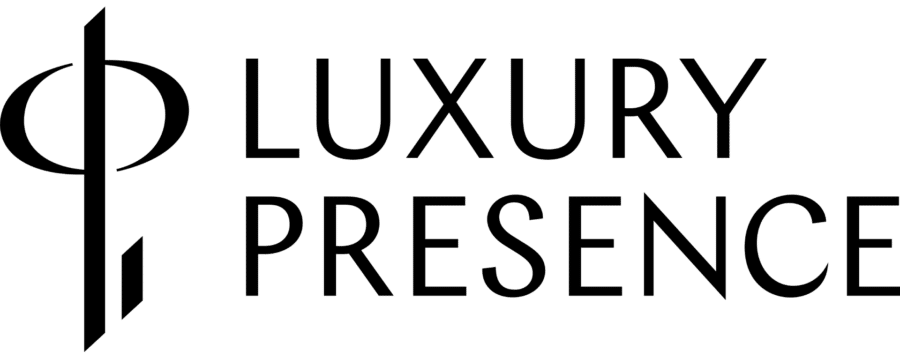 |
|
No upfront pricing for SEO services |
| Get started with Luxury Presence | ||
 |
|
Can range from $1,500-$5,000 monthly |
| Get started with Markitors | ||
 |
|
No upfront pricing for SEO services |
| Get started with Victorious | ||
 |
|
No upfront pricing for SEO services |
| Get started with Agent Image | ||
Real Estate Webmasters: Best all-in-one digital marketing company

-

Headquarters:
Nanaimo, British Columbia, Canada -

Key features and services:
Built-in CRM and lead management tools; PPC advertising campaigns to drive immediate traffic
Why I chose Real Estate Webmasters
Real Estate Webmasters offers a comprehensive digital solution tailored specifically for real estate professionals. The company focuses on creating SEO-friendly content while also optimizing site speed, mobile responsiveness, and IDX integration.
Plus, its local SEO and reputation-building services help you stand out in your market and attract the right clients. With built-in CRM tools and the option to outsource content, PPC, and SEO strategy, Real Estate Webmasters make it easy for agents and teams to streamline their marketing.
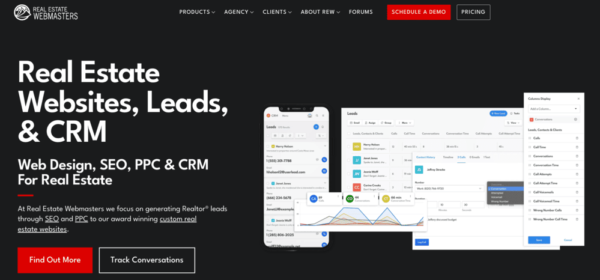
Services and pricing overview
SEO services:
- Off-page SEO (Guest blogging, backlink outreach, local SEO, social media engagement, review acquisition)
- SEO-focused community, lifestyle, and property-type pages
- Buyer, seller, and relocation guides
- Spiderable IDX integration to improve listing indexation and organic performance
- Technical SEO elements, including fast loading times, mobile optimization, and structure enhancements
Pricing tiers:
- Agent – Small Team: $500 per month (additional users cost $25 per user/month)
- Team – Brokerage: $1,000 (additional users cost $25 per user/month)
- Enterprise: $1,500+ (contact them for per-user pricing)
Pros and cons
| Real Estate Webmasters pros | Real Estate Webmasters cons |
|---|---|
|
|
|
|
|
|
Notable clients and case studies
Luxury Presence: Best for luxury agents and teams
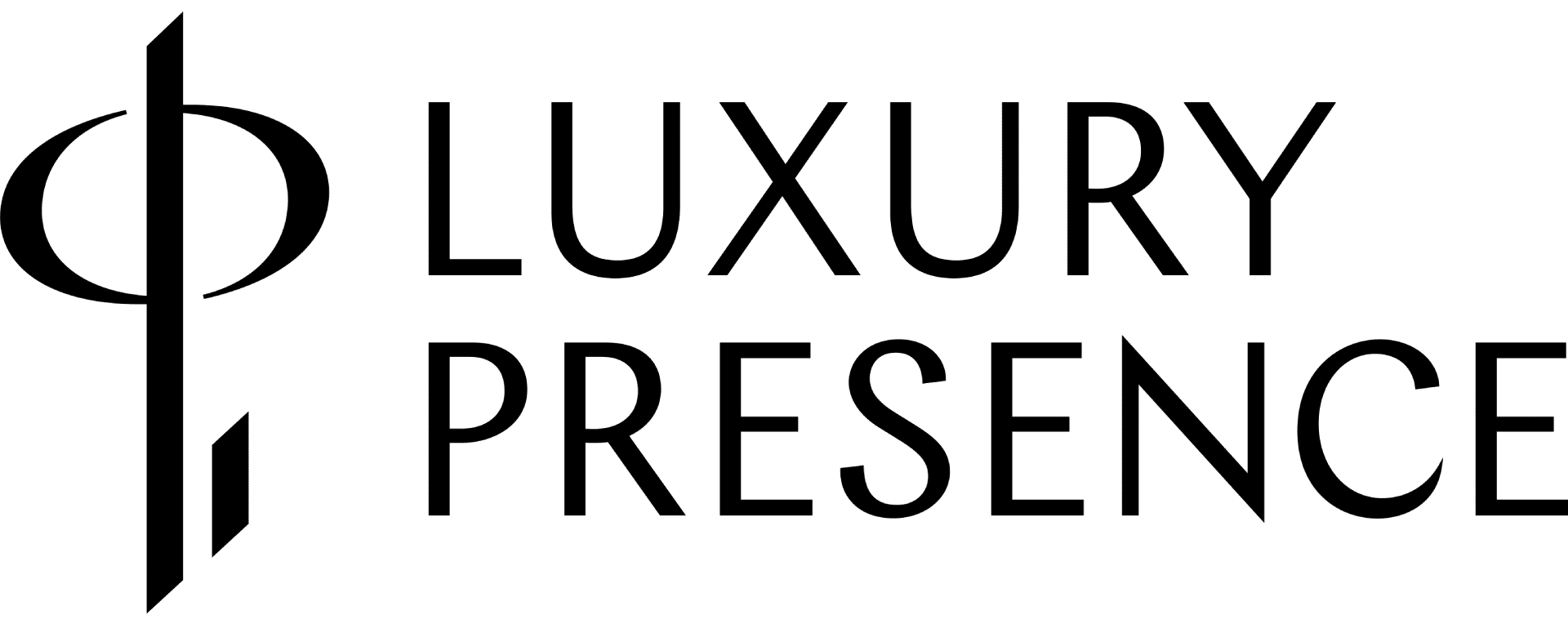
-

Headquarters:
Austin, Texas -

Key features and services:
High-end, custom website designs tailored for luxury listings; SEO strategies focused on high-net-worth clientele
Why I chose Luxury Presence
If you’re in luxury real estate and want to elevate your digital game with a company that understands the luxury market inside out, Luxury Presence is a standout choice. Its SEO strategies are paired with polished, modern design and branding that signal trust, exclusivity, and professionalism — key elements in the luxury space.
Luxury Presence is trusted by some of the most successful agents and teams — Tracy Tutor, Jade Mills, Ryan Serhant, and The Fridman Group — so you know you’re in good company.
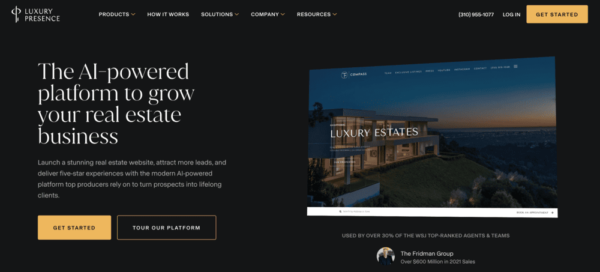
Services and pricing overview
SEO services:
- AI-powered SEO
- Google Business Profile optimization
- Technical optimization (site speed, mobile responsiveness, and proper indexing)
- On-page SEO
- Content creation
*No upfront pricing for SEO services
Pros and cons
| Luxury Presence pros | Luxury Presence cons |
|---|---|
|
|
|
|
|
|
Notable clients and case studies
Markitors: Best for customized SEO solutions for small businesses

-

Headquarters:
Scottsdale, Arizona -

Key features and services:
Local SEO services to enhance visibility in specific markets; digital PR campaigns to build brand authority and backlinks
Why I chose Markitors
Markitors starts every partnership with a deep-dive SEO audit and tailored strategy session, so you know you’re not getting a one-size-fits-all plan but a roadmap tailored to your goals, market, and competition. The company focuses on technical SEO, custom content, and targeted link building, all designed to meet the specific needs of your business.
Each client works with a dedicated account manager who tracks progress, adjusts tactics, and keeps you informed with regular reporting. That level of hands-on service and flexibility makes Markitors an excellent choice for agents and brokerages seeking SEO solutions tailored specifically to their needs.
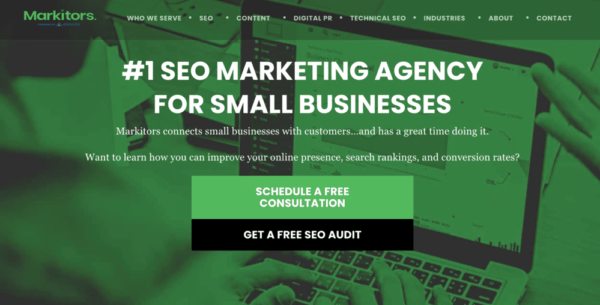
Services and pricing overview
EO services:
- Landing page content creation
- Keyword research
- Backlink building
- SEO audit and implementations
- Technical SEO (content optimization, interlinking, image optimization, broken link repair, URL canonicalization, website schema, and more)
- Weekly reporting
Pricing: Markitors’ SEO services range from $1,500-$5,000 per month.
Pros and cons
| Markitors pros | Markitors cons |
|---|---|
|
|
|
|
|
|
Notable clients and case studies
- Y Scouts (a recruitment firm)
- Go Clean Credit
- Unnamed commercial real estate firm
Victorious: Best for large teams and brokerages

-

Headquarters:
San Francisco, California -

Key features and services:
Comprehensive keyword research and competitive analysis;
on-page and technical SEO optimizations
Why I chose Victorious
Victorious is built for scale, making it an excellent choice for established real estate brokerages and large teams ready to expand their digital footprint. Its SEO approach is deeply analytical, tying every strategy — like keyword research, on-page SEO, and link building — back to revenue and performance goals.
What really sets Victorious apart is its ability to manage complex, high-volume SEO campaigns without losing sight of results. If your team is past the $10 million revenue mark and needs a partner that can handle aggressive growth targets, Victorious brings the structure and scale to match.

Services and pricing overview
SEO services:
- On-page SEO
- Keyword research
- Technical SEO
- Off-page SEO
- Link building
- SEO audit
*No upfront pricing for SEO services
Pros and cons
| Victorious pros | Victorious cons |
|---|---|
|
|
|
|
|
|
Notable clients and case studies
- SF Office Spaces
- Exceptional Villas
- GE Digital (non-real estate)
Agent Image: Best for website design with premium SEO fundamentals

-

Headquarters:
El Segundo, California -

Key features and services:
SEO-optimized content creation, including neighborhood pages; custom website designs tailored for real estate branding
Why I chose Agent Image
Agent Image is known for its real estate website builder — in fact, it made our list of the best real estate website builders — but it also offers comprehensive SEO services that extend beyond design and development. This includes on-page optimization, content marketing, and local SEO strategies designed to enhance your visibility in search results.
What makes it stand out is how seamlessly SEO is built into the website from the ground up. Meaning that you’re not just getting a pretty site, but you’re getting one that performs. If you’re after a polished online presence with real search power behind it, Agent Image is an innovative solution.
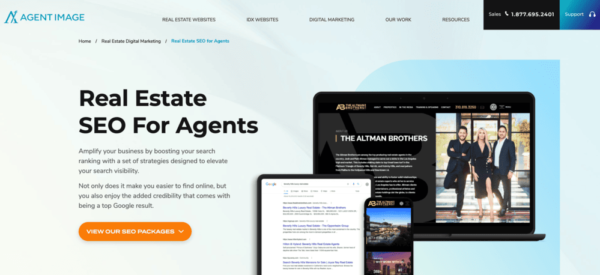
Services and pricing overview
SEO packages:
- Ultimate SEO page: 2,500-word SEO page, designed content with multimedia, content outline creation, backlinks, on-page SEO, indexing and improvements, performance report
- SEO Local (one-time setup): Competitor analysis, keyword research, meta tags creation, website audit, manage online business listings, Google & Facebook integration, local search setup, Google My Business
*No upfront pricing for SEO services
Pros and cons
| Agent Image pros | Agent Image cons |
|---|---|
|
|
|
|
|
|
Notable clients and case studies
How to choose the best real estate SEO company for your business
When comparing real estate SEO companies, here’s what you should focus on to make sure you pick the right fit:
-

Budget alignment:
Make sure that the company’s pricing model aligns with your goals and budget. Whether the real estate SEO company charges by the project, by retainer, or on performance, you should know precisely what you’re getting. -

Real estate expertise:
The best SEO company for real estate knows how to speak your language. Go with a company that understands the nuances of neighborhood pages, listing optimization, and the local buyer journey. -

Proven results:
Look for real case studies and verified user reviews. Ensure that your chosen SEO company really boosts traffic or leads for clients like you.
-

Full-service vs niche focus:
Decide if you want an all-in-one agency handling SEO, content, website building, and ads or a boutique shop laser-focused on local search. -

Transparent communication:
Throughout your partnership, you’ll want regular check-ins, clear reporting dashboards, and honest conversations about what’s working and what isn’t. If they can’t explain their strategy in plain English, keep looking.
Methodology: How we selected the best SEO companies for realtors
Our expert writers, editors, researchers, and agents at The Close evaluated dozens of real estate SEO companies. We analyzed each company and based our top choices on the following criteria:
- Pricing: We examined the pricing of SEO services, specifically whether they offer transparent and fair pricing models that align with the budgets of individual agents or large brokerages.
- SEO services: We reviewed the scope and quality of SEO offerings, encompassing keyword research, on-page optimization, local SEO, and content creation.
- Customer service: We assessed each company’s responsiveness, transparency, and commitment to client success.
- Track record: We considered proven results, client success stories, and recognizable agents and brokerages they’ve worked with.
- Expert score: Our team rated each company based on overall quality, service depth, and industry reputation.
Read more about our methodology here.
Frequently asked questions (FAQs)
Does SEO work for real estate?
Absolutely! Real estate SEO makes your brand more visible in local searches, so clients can find you when they’re looking to buy or sell. It’s a long-term strategy that helps build credibility and drives organic traffic.
How much does real estate SEO cost?
The cost of real estate SEO varies, ranging from a few hundred dollars per month for basic packages to several thousand dollars for more in-depth strategies. Prices depend on the scope of services, the SEO company, and the level of competition in your local market.
Is paying someone to do SEO worth it?
If you’re looking to grow your real estate business faster and with less hassle, hiring an SEO pro is definitely worth it. SEO professionals bring the expertise and tools needed to boost your online presence and ultimately close more deals.
Your take
Whichever path you choose, each of these companies brings a unique strength to help you rank higher and capture better leads. Have you used any of these real estate SEO companies for your marketing efforts? Share your experience in the comments!
The post Best SEO Companies for Real Estate in 2025 appeared first on The Close.

How To Become a Successful Real Estate Agent (Minus the Burnout + Free Milestone Roadmap)
If you look at popular culture and shows like “Selling Sunset,” you might think that becoming a successful real estate agent is easy for anyone interested in dope properties and chic outfits. In reality, it isn’t for the faint of heart; it takes serious time, […]
MarketingIf you look at popular culture and shows like “Selling Sunset,” you might think that becoming a successful real estate agent is easy for anyone interested in dope properties and chic outfits. In reality, it isn’t for the faint of heart; it takes serious time, effort, and willingness to push through challenges. 
To succeed, I recommend starting by identifying your mission, vision, and values and then preparing a clear business plan. Then, build a strong personal brand that reflects your unique strengths. You’ll also want to choose a supportive brokerage and mentor, specialize in a niche to stand out, and prepare for slow periods (these will happen!). Most importantly, stay resilient and learn from setbacks.
I’ve also included a free downloadable roadmap to help you build intention if you’re fresh to the scene or refine and scale if you’re a seasoned realtor.
Get your milestone roadmap from The Close
1. Set your compass before you sell the map.
To succeed in real estate, begin by defining what’s most important and meaningful to you and how you can apply those things to your business. Your mission, vision, and values define your core purpose and give you direction.
- Mission: Your current purpose in serving clients (e.g., “Delivering curb appeal, contract wins, and coffee-fueled commitment!”).
- Vision: Your long-term aspirations (e.g., “To create a world where moving is an adventure — with great snacks and even better service.”).
- Values: The principles that guide your behavior (e.g., authenticity, connection, and drive).
Ask yourself questions like these when crafting your real estate mission statement:
- Why do I want a career in real estate?
- Who do I want to help?
- What’s important to me as an entrepreneur?
- What impact do I want to have on my local community?
Knowing these crucial aspects of your business will drive your success and give you a sense of purpose.

2. Plot your empire: the game plan begins.
Once you’ve identified your guiding framework, write a real estate business plan. This plan is a way to track goals and make the wisest decisions, like a roadmap to success for growing your real estate business. It should include your mission, who you want to work with (your ideal client), your farm area, your marketing strategy, and an honest evaluation of your strengths and weaknesses.
I prepared this simple business plan to give you an idea of what it can look like:
As you choose the best real estate company to work for, make sure you also consider what they offer in terms of marketing assistance, lead generation, real estate software, or additional income opportunities. The company you choose will impact your real estate salary and, ultimately, your success. Make it a point to interview several brokerages before choosing the one that fits you best.
 Mission: Delivering curb appeal, contract wins, and coffee-fueled commitment!
Mission: Delivering curb appeal, contract wins, and coffee-fueled commitment!
 Vision: To create a world where moving is an adventure — with great snacks and even better service.
Vision: To create a world where moving is an adventure — with great snacks and even better service.
 Values:
Values:
- Authenticity: I keep it real, from coffee chats to contracts. What you see is what you get, and that builds trust.
- Connection: Relationships > transactions. Whether it’s a meme or an open house party, I’m in it for the long-haul connection.
- Drive: Fueled by hustle (and caffeine), I bring great energy, follow-through, and a “let’s make it happen” mindset to every deal.
 Goals:
Goals:
- Close 25+ homes this year
- Have a 70% referral-based business
- Grow social following and community love
 Services:
Services:
- Buying and selling homes
- First-time buyer help
- Virtual tours and local guides
 Marketing:
Marketing:
- Monthly “Hot Homes & Vibey Vibes” email
- Reels, memes, and market tips on social
- Pop-bys, client gifts, and open house parties
 Revenue:
Revenue:
- Standard commissions
- Partnerships with local businesses
 Not-so-secret-anymore sauce: Genuine, approachable, and all about you.
Not-so-secret-anymore sauce: Genuine, approachable, and all about you.
3. Become a brand, not just an agent.
Many enter the real estate world thinking their brokerage’s name will do the heavy lifting. But clients don’t choose logos, they choose people. So, you’ll want to make the move from agent to entrepreneur.
Becoming a brand means being intentional about how you’re seen, remembered, and referred to. Think of your real estate branding as your reputation in surround sound — the vibe people get when they see your content, hear your name, or meet you in person. 
Focus on the following:
- Client testimonials
- A unique value proposition
- A well-designed website
- Consistent social media presence

Personal branding success story: Ryan Serhant, known from the reality TV series “Million Dollar Listing New York,” leveraged his acting background to build a personal real estate brand. With over 8 million followers across several social platforms, he emphasizes the importance of authenticity and digital marketing. SERHANT, his firm, even secured the most expensive residential listing in the US, a $250 million penthouse in NYC. This highlights the impact of becoming a strong brand.
4. Focus on your unique personality and strengths.
Authenticity is powerful in real estate, and people are drawn to agents who are genuine. If you’re a great communicator, emphasize client engagement; if you’re detail-oriented, highlight your precision in transactions. Rather than copying what everyone else is doing, play to your natural advantages.
I can understand why many new agents think that they have to do X, Y, and Z to succeed; that’s what they see. However, your personality is an important part of your business, and in a people-first industry, who you are can matter more than what you know.
For example, if you’re an introvert, cold-calling FSBOs and door-knocking would not be enjoyable. Even if it’s an effective strategy for another agent in your area, you’ll feel burnt out trying a method that doesn’t suit your strengths.
Remember, your individuality is your unfair advantage.  When you lean into it, you attract people who resonate with your style, and business becomes a whole lot more enjoyable and authentic.
When you lean into it, you attract people who resonate with your style, and business becomes a whole lot more enjoyable and authentic.
 Take our free real estate sales personality quiz to learn which personality and marketing methods fit you best; you might be a creative, a sales pro, an introvert, a community expert, or an innovator.
Take our free real estate sales personality quiz to learn which personality and marketing methods fit you best; you might be a creative, a sales pro, an introvert, a community expert, or an innovator.
5. Sharpen your business skills like a boss.
Real estate is not just sales — it’s also a business. Many professionals focus heavily on lead generation, listings, and client service (which are essential), but what separates thriving agents from surviving ones is mastering the business side of the business.
- Be strategic instead of reactive.
- Make decisions with intention and data.
- Invest in tools and training that compound your success.
- Build a business that serves your life, not the other way around.
- Read business books (like “The E-Myth Revisited” by Michael E. Gerber, “Atomic Habits” by James Clear, or “Profit First” by Mike Michalowicz) or the best real estate books.
- Training programs
- Marketing assistance
- Lead generation
- Technology and tools offered
- Reputation in the market
- Culture and support
- Additional income opportunities
- Help you prepare for things that no textbook or course can anticipate.
- Take years off your learning timeline; instead of trial and error, you get real insights from someone who’s already done what you want to do.
- Teach you what you don’t learn in pre-licensing courses, such as how to 1) read between the lines of a contract; 2) manage emotional clients or difficult negotiations; and 3) bounce back when a deal falls through.
- Keep you on track, push you when you’re stuck, and celebrate wins with you.
- Introduce you to their trusted circle of lenders, inspectors, title companies, and other agents.
- potential clients
- real estate professionals
- business owners or other professionals like mortgage brokers, home inspectors, and lawyers
- Attend industry events.
- Join local business groups.
- Connect with lenders, inspectors, and contractors.
- Stay in touch with past clients.
- Farm areas or specific neighborhoods
- Military clients
- Rentals
- Buyers or sellers
- First-time homebuyers
- Vacation rentals
- Luxury real estate
- Real Estate Marketing Tools: Lets you create, schedule, and manage marketing like a boss. Check our list of the best marketing tools for some options to streamline your workflow.
- Real Estate Lead Generation Companies: Help you scale faster without spending hours prospecting manually. Our guide to the best lead generation companies has some vetted picks.
- Best CRM for Real Estate: Is your hub for lead tracking, client notes, and follow-ups. Use one of our top-recommended CRMs for real estate to keep your efforts organized.
- Best Real Estate Website Builders: Offers you more than a digital business card; you get a 24/7 lead converter, personal brand hub, and content platform. Our roundup of the best website builders has some easy-to-use and affordable options to set you up for success.
- Expecting convenience, speed, and transparency, clients compare agents based on how easy you are to reach, how smooth your process is, and how sharp your digital presence looks.
- Running a real estate business requires you to wear several hats (e.g., agent, marketer, admin, transaction coordinator, and social media manager), and tech removes friction and gives you back time.
- Leveraging automation for repetitive tasks like follow-ups and paperwork lets you focus more on people, strategy, and business growth.
- Set aside a percentage of your commissions from your busier months; aim for 3 to 6 months of expenses covered.
- Diversify your income stream by getting real estate side hustles, like doing photography, teaching, or managing properties.
- Look into other jobs you can get with a real estate license to supplement or replace your sales income.
- Educate clients about market trends through newsletters or reports
- Host client appreciation events to stay top-of-mind
- Build new referral relationships with agents, mortgage lenders, and other professionals
- Learn the vibe of each street: Is it quiet? Kid-friendly? Up-and-coming?
- Subscribe to local MLS updates and market reports.
- Set a weekly routine to analyze data.
- Follow local government planning and zoning meetings.
- Note renovations, FSBOs, investor flips, or upcoming for-sale signs
- Talk to locals at open houses, coffee shops, and parks.
- Win better deals for clients without derailing the transaction
- Resolve conflicts calmly and constructively
- Build trust and long-term relationships with clients and other agents
- Close deals faster and with fewer complications
- After a deal or opportunity falls apart, ask yourself what worked, what didn’t work, and what you would do differently next time.
- Track insights from failures and near-misses so that you can spot patterns and remind yourself how far you’ve come.
- Normalize setbacks by reaching out to other realtors to vent, share experiences, and remind yourself you’re not alone.
- Prioritize self-care to remove stressors, like doing meditation, exercising, and getting good quality sleep.
- Interest rates: High mortgage rates often dampen home sales, which directly affects the demand for agents.
- Housing market cycles: Periods of economic expansion tend to increase the demand for housing and real estate agents, while downturns suppress it.
- Technology: Online listings and real estate platforms have changed how agents interact with buyers and sellers, pushing agents to provide more personalized and value-added services.
- Urban vs rural dynamics: Job prospects are generally better in growing urban and suburban markets, where housing development and turnover are more active.
- Experience and time commitment: Agents with more years in the industry and those working full-time typically earn higher incomes. For example, those with 11 to 25 years of experience often earn significantly more than beginners.
- Geographic location: Location, location, location…
 Agents in high-demand or high-cost areas (like California or New York) usually earn more due to higher property values and market activity.
Agents in high-demand or high-cost areas (like California or New York) usually earn more due to higher property values and market activity. - Specialization: Focusing on a niche (such as luxury homes, commercial real estate, or rentals) can lead to higher commissions and a more consistent client base.
- Brokerage commission splits: The percentage of commission an agent keeps after splitting with their brokerage directly affects income. Some brokerages offer better splits or cap fees to maximize agent earnings.
- Market conditions: Economic factors like interest rates, housing inventory, and local demand influence how many properties agents can sell and how much they can earn.
- Education and skills: Agents who invest in CE and build strong skills in negotiation, marketing, and tech tools often close more deals and earn more.

- Regulatory changes: Shifts in industry regulations (such as recent changes to commission structures) can impact how agents are compensated going forward.
- Treat it like a business. Real estate is not a job — it’s a business that you’re building, so approach it with an entrepreneurial mindset.
- Be patient. The first few months may bring few leads and fewer closings. Set realistic goals and commit to consistent effort.
- Stay resilient. Rejection, failed deals, and dry spells are part of the game.
Remember, your areas for improvement should not prevent you from learning how to become a successful real estate agent. Instead, seek continuing education (CE) courses, get additional brokerage training, or speak with a mentor about honing the skills you need to improve.
6. Keep learning so that you keep earning.
“The more you learn, the more places you’ll go.” Real estate laws, technologies, and customer expectations don’t stop evolving, and the most successful agents are lifelong learners.
You’ll want to stay sharp, adaptable, and ahead of the curve, so invest in additional certifications like Certified Residential Specialist (CRS) or Accredited Buyer’s Representative (ABR). Those not only expand your expertise but also boost your professional image.
I encourage you to stay educated to become a more effective advocate for your clients, allowing you to handle complex situations with confidence.  When you’re constantly improving, clients remember you for your value, not just your friendliness; other agents respect you — and refer to you; and you position yourself as the go-to expert in your niche.
When you’re constantly improving, clients remember you for your value, not just your friendliness; other agents respect you — and refer to you; and you position yourself as the go-to expert in your niche.
 Related resources:
Related resources:
7. Find your brokerage soulmate.
One of the first tasks you’ll do when you get your real estate license is to choose a brokerage to work with. This decision can be daunting, as your brokerage affects your training, commission splits, leads, and professional environment.
Consider the following when choosing the best real estate company to work for:
The brokerage you go with will impact your real estate agent salary and, ultimately, your success. Make it a point to interview several companies before selecting the one that fits you best.
8. Mentor up.
This can be a game-changer, whether you plan to jump into real estate full-time or become a part-time real estate agent. A mentor accelerates your learning and helps you avoid costly mistakes.
They can
The best place to find a mentor is from your brokerage or at local networking events. Some brokerages have a mentorship program where you can pick or be assigned a specific mentor to help you as you get started. For instance, eXp Realty’s Mentor Program will match any agent with fewer than three transactions in the last 12 months with a mentor.
Personal branding success story:If you don’t have an official mentor assigned to you, I recommend asking around your brokerage for senior agents who may be willing to meet with you. You can also attend local real estate events or ask colleagues for introductions to pros. 
9. Build connections that open doors.
A common real estate saying is, “Your success is directly tied to who you know.” You may have also heard, “It’s not what you know, but who you know.”
In real estate, your network (also called your sphere of influence) is the foundation of all success. It consists of everyone you know, including
People are more likely to hire someone they already know and trust than a stranger. They’re also likely to go with an agent personally recommended by someone else they trust. This means that your network is your bread and butter, where most of your leads and referrals will come from.
A strong network that generates consistent, valuable leads doesn’t happen by accident — you have to nurture it and actively reach out to create new relationships. Here are some tips:
Also, keep in touch with your network in various ways throughout the year. Those include email, text, phone calls, snail mail, social media, or in-person events.
 Related resources:
Related resources:
10. Niche it to win it.
I can understand why, as a newer agent, you may be tempted to take all possible clients, regardless of their specific needs. However, doing that usually takes more of your time and energy. When you focus on a niche that fits your personality or interests, your business becomes more fulfilling and way less draining.
Choosing a niche doesn’t mean turning away business. Instead, it means positioning yourself to attract better business. Niching lets you speak your client’s language and address their unique pain points, which may result in better leads and faster conversations. It helps you build authority within a specialized area and market more strategically to a specific audience.
Some popular real estate niches include:
Sometimes, a niche will come naturally as you start your career, but other times, it will require intentionality to find a gap in the market. Once you find it, put yourself in the shoes of your potential clients to determine their needs and how you can help them. Also, ensure you brush up on real estate terms specific to your clients or properties.

Niche specialization success story: Premier Estate Properties, a boutique firm in Boca Raton, Florida, concentrates exclusively on the high-end luxury market. It exceeded $3 billion in one 12-month period, per REALTOR® Magazine Media, proving that niching can definitely win!
11. Stack your toolkit with smart tech.
“Work smarter, not harder.” Sure, you could do most real estate tasks manually, but you can massively increase your productivity and results by choosing the right real estate tools.  In a world of AI and unlimited software programs, the choices can be overwhelming. I encourage you to focus on solutions that keep you organized and accountable, such as the following:
In a world of AI and unlimited software programs, the choices can be overwhelming. I encourage you to focus on solutions that keep you organized and accountable, such as the following:
Here are a few reasons why smart tech matters:
12. Save for rainy days (and dry listings).
Even for the best realtors in the country, success varies from month to month, and this inconsistency is one of the biggest challenges of the career. The slowest period of the real estate market is typically December through February, whereas the peak season runs from April to June, per the National Association of Realtors.
I recommend building financial resilience to survive slow seasons, market shifts, and personal slumps.
Also, consider using the slower season to maintain relationships and brand visibility. You can
Saving isn’t just about security — it’s about freedom. Freedom to walk away from bad clients, to invest in your growth, and to weather downturns without panic. 
13. Spy on the market like a neighborhood ninja.
Keeping well-informed about the current market is essential.  It’s not enough to just keep an eye on listings; you also have to master your farm area so that you can deliver sharp insights, anticipate trends, and speak about the neighborhood like you live and breathe it. This means monitoring home prices, inventory levels, days on market, interest rates, and emerging neighborhood developments.
It’s not enough to just keep an eye on listings; you also have to master your farm area so that you can deliver sharp insights, anticipate trends, and speak about the neighborhood like you live and breathe it. This means monitoring home prices, inventory levels, days on market, interest rates, and emerging neighborhood developments.
By understanding such trends, you can better guide your clients and set realistic expectations, which in turn builds trust and credibility. You’re not just learning stats but also picking up the neighborhood’s story.
14. Work that poker face like a pro.
Being a great negotiator means more than just securing a lower price. It means mastering your emotions and controlling your reactions, especially in high-stakes situations, as well as knowing when to push, when to compromise, and how to communicate your client’s needs effectively. 
Strong negotiation skills can enhance your reputation as a skilled professional. It allows you to
Becoming a master negotiator is about developing a mindset of empathy, strategic thinking, and confidence. In real estate, where deals involve high emotion, this skill can set you apart as a trusted, results-driven professional.
| Scenario | What to do |
|---|---|
| Presenting pricing advice | Don’t flinch at unrealistic expectations; be confident and steady. |
| Receiving an offer | Don’t celebrate too early or show disappointment. |
| Talking with emotional clients | Let them vent, but don’t get swept into the emotion. |
| Being in bidding wars | Keep your cool, and don’t let your buyer know you’re nervous. |
Remember, clients need you to be the calm in the chaos. If you look panicked, uncertain, or overly excited, you risk making them feel anxious. What’s worse, you may lose negotiating power.
15. Fail forward. Bounce back braver.
This is an empowering mindset that you should adopt, especially in an industry where rejection, unpredictability, and setbacks are part of the game. Leads may hang up on you mid-sentence, doors may be slammed in your face, people you thought you connected with may ghost you, and deals may fall through at the last minute — no matter how hard you work.
If you’re willing to learn, the real estate industry will force you to be resilient and to learn how to bounce back.
Boom or bust? What the real estate agent job market’s future holds
Per the Bureau of Labor Statistics, employment for real estate brokers and sales agents is projected to grow by only 2% from 2023 to 2033, which is slower than the average for all occupations.
Key factors affecting the job market of real estate agents include the following:
Still, with thousands of job openings expected each year (mostly from turnover and retirements), there’s room to build a successful career if you’re a driven agent, especially if you understand what’s shaping the industry. 
 Related resource: Real Estate Agent Tips for Newbies
Related resource: Real Estate Agent Tips for Newbies
How much do real estate agents really make?
The average annual salary of a real estate agent in the US is $85,793, per ZipRecruiter’s May 2025 data. However, earnings vary significantly based on location, experience, and specialization. For instance, a real estate sales agent in Soledad, California, reportedly earns an average of $128,338 a year. 
So while the real estate profession offers substantial earning potential, especially for top performers, it is characterized by variability and influenced by market conditions. Here are other key factors that affect a real estate agent’s salary:
Frequently asked questions (FAQs)
Is it hard to become successful in real estate?
Yes, as becoming a successful real estate agent takes dedication. However, it is possible for anyone who is willing to put in the time and effort to improve their skills, bounce back from rejection, and learn what works for their business.
What are the chances of becoming a successful real estate agent?
The chances of becoming a successful real estate agent depend on multiple factors, including your location, work ethic, skills, personality, training, and support system. Statistically, many new agents struggle. However, with the right strategies and mindset, success is absolutely achievable.
How do you survive your first year in real estate?
It will come down to your preparation and growth. You need to have a few months of expenses saved up for the beginning of your career so that you can focus on growth — growing your network, leads, clientele, marketing tools, and real estate knowledge.
How to make $100,000 your first year in real estate?
To make $100,000 in your first year, you need to treat it like a full-time business. Start by understanding how much you need to produce in sales (i.e., how many transactions do you need in the year to get that $100,000) and joining a brokerage that provides quality training and mentorship. Then, commit to generating leads daily, with a focus on building real relationships and following up persistently. With discipline and daily action, closing $100,000 worth of deals in your first year (depending on your market and average commission) is achievable.
What do most realtors struggle with?
Most realtors struggle with consistently generating and converting leads, especially in competitive or slow markets. Time management may also be a challenge, as balancing showings, paperwork, client communication, and marketing can be overwhelming.
Many also find it tough to stand out in a crowded market and build a strong personal brand — and keeping up with changing technology, market trends, and legal regulations adds pressure. Additionally, the emotional toll of unpredictable income and client-related stress, such as managing unrealistic expectations, can make things particularly difficult.
The final walkthrough
Learning how to become a successful real estate agent may seem simple, but it requires much dedication and strategy. You’ll give yourself the best chances of success by following the strategies in this guide, intentionally building a network, leveraging technology and tools, and preparing for the inevitable ebbs and flows of the market.
The post How To Become a Successful Real Estate Agent (Minus the Burnout + Free Milestone Roadmap) appeared first on The Close.
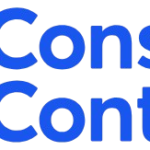
The 8 Best Real Estate Marketing Companies for 2025
As a real estate agent, you might think or even know how much better you are compared to others. But how do you convey that message to potential clients and convince them to use your services when buying or selling a home? The answer? Marketing. […]
MarketingAs a real estate agent, you might think or even know how much better you are compared to others. But how do you convey that message to potential clients and convince them to use your services when buying or selling a home?
The answer? Marketing.
Done right, marketing can help you build meaningful, trusting relationships with clients as you demonstrate your expertise and knowledge of the local market, showcasing the amount of value you can provide so that your potential clients say, “Whoa, I’m in!”
I’ve researched over a dozen companies and narrowed the list to the eight best real estate marketing companies. These providers have tools to help broaden your reach of clients with your own personal brand to attract more buyers and sellers.
- Constant Contact: Best for SMS & email marketing
- Market Leader: Best for all-in-one marketing solution
- Easy Agent Pro: Best for lead generation
- Coffee & Contracts: Best for social media marketing
- Real Geeks: Best real estate IDX website builder
- Agent Image: Best website builder for premium image branding
- Luxury Presence: Best for custom website design and brand development
- Agent Crate: Best for templates for print and digital marketing
My top picks for the best real estate marketing companies
| Standout features | Monthly starting price | |
|---|---|---|
|
$12 | |
| Constant Contact | ||
|
$189 + approx. $25/lead based on location | |
| Market Leader | ||
|
$191* + $199 activation fee | |
| Easy Agent Pro | ||
|
$74* | |
| Coffee & Contracts | ||
|
$299* + one-time sign-up fee | |
| Real Geeks | ||
|
Call for pricing | |
| Agent Image | ||
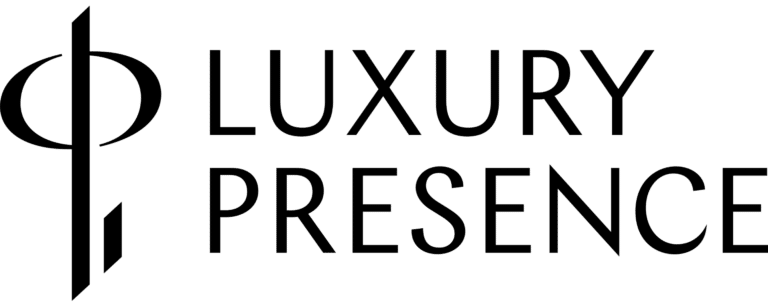 |
|
$250 licensing fees + $2,500 setup |
| Luxury Presence | ||
|
$39 | |
| Agent Crate | ||
*Billed annually
Constant Contact: Best for SMS & email marketing

- Built-in CRM system
- Social media management tools
- Modern and beginner-friendly email template editor
- AI-powered tools
- Some features carry a 30-day free trial
- No free plan
of
Why I chose Constant Contact
Constant Contact states that with message open rates as high as 98%, sending marketing messages via SMS text can be a great way to make sure your message is seen.
With an AI-powered content generator, you don’t exactly have to be a wizard with words to be able to craft a well-written message that has a profound impact on potential clients. You can simply feed it keywords, and its AI system will turn them into engaging content you can simply copy and paste into an SMS campaign that you can use as just one of several effective marketing ideas. Constant Contact can also help you with email marketing. You’ll be able to utilize templates, automations, and social media integrations to sell your personal brand to your audience. You’ll also be able to access reporting to track the effectiveness of your marketing campaigns over time.
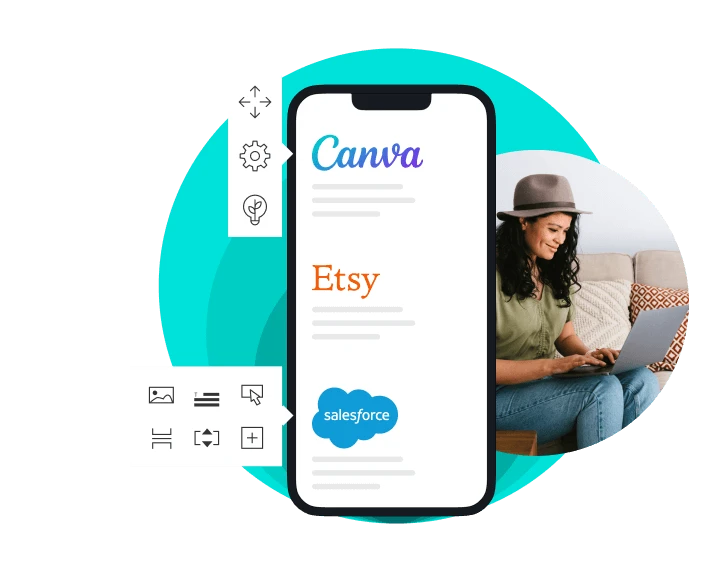
Standout features
- List-building tools: Quickly grow your audience, leads, and potential new clients by capturing contact information through fun surveys, quizzes, social ads, and more.
- Automations: Ensure that your emails and SMS texts get sent to the right people at the right moment with Constant Contact’s automation features. You can even choose from existing automation templates to help you decide when certain messages should be sent.
- AI assistant: AI-powered tools can not only help you craft emails and text messages but also help you create a library full of custom-branded assets based on your website’s colors and imagery.
Market Leader: Best all-in-one marketing solution

- Network Boost that generates inexpensive social media leads
- All-in-one website and CRM solution
- Lead behavior tracking
- Direct mail tools integrated with digital marketing strategy
- Automated lead nurturing and conversion tracking
- Minimum six-month contract
- Leads limited in competitive ZIP codes
- Lack of price transparency
- Limited analytics
- No texting included in lead nurturing automation
of
Why I chose Market Leader
Market Leader is my pick as the best all-in-one solution because it offers multiple marketing tools. These include a CRM, a website builder, social media integrations, exclusive monthly leads, and much more. For these reasons, Market Leader was also selected for our list of the best real estate lead generation companies.
Each of the tools offered by Market Leader has unique features to help improve the chances of landing a paying client. You’ll be able to drive more consumers to your company’s website, capture motivated leads via social ads, and build your list of potential clients with social media integrations.
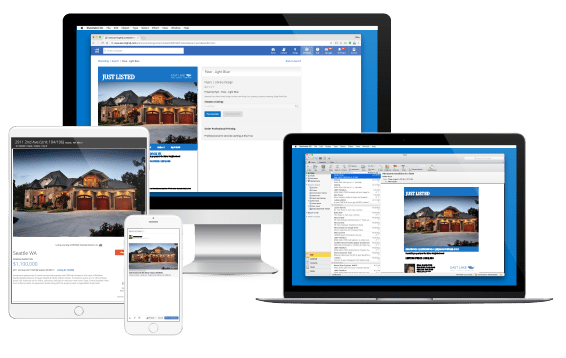
Standout features
- Hot leads: Market Leader can track which stage of the homebuying process your leads are in, following up with automated emails and alerting you when they’re identified as highly motivated buyers.
- Exclusive monthly leads: With a regular supply of exclusive leads, your chances of landing a client drastically increase, as you’ll have less competition with other agents.
- CRM integration & automations: Add contact information for leads into Market Leader’s CRM, and set up drip campaigns for automated follow-ups on a regular basis.
Easy Agent Pro: Best for lead generation

- Good value for cost
- Highly customizable
- Social media integration
- SEO-optimized content provided
- Easy integration with popular CRMs, including LionDesk, Follow Up Boss, and Wise Agent
- No free trial
- No mobile app
- No print mail solutions
- No live chat and 24/7 customer support
- Limited lead tracking
of
Why I chose Easy Agent Pro
Easy Agent Pro is a digital marketing platform that helps you generate leads to grow your business. It does this by offering IDX-ready websites, campaign setups, and market reports for buyers and sellers. It also integrates with a wide range of CRMs and social media platforms to reach even more clients.
With its website functionality, you’ll be able to create custom landing pages for different purposes or properties, built-in SEO tools to improve your search visibility, the ability to generate hyperlocal market reports, and an SEO optimization task tool so you can figure out what to tackle first to generate results.
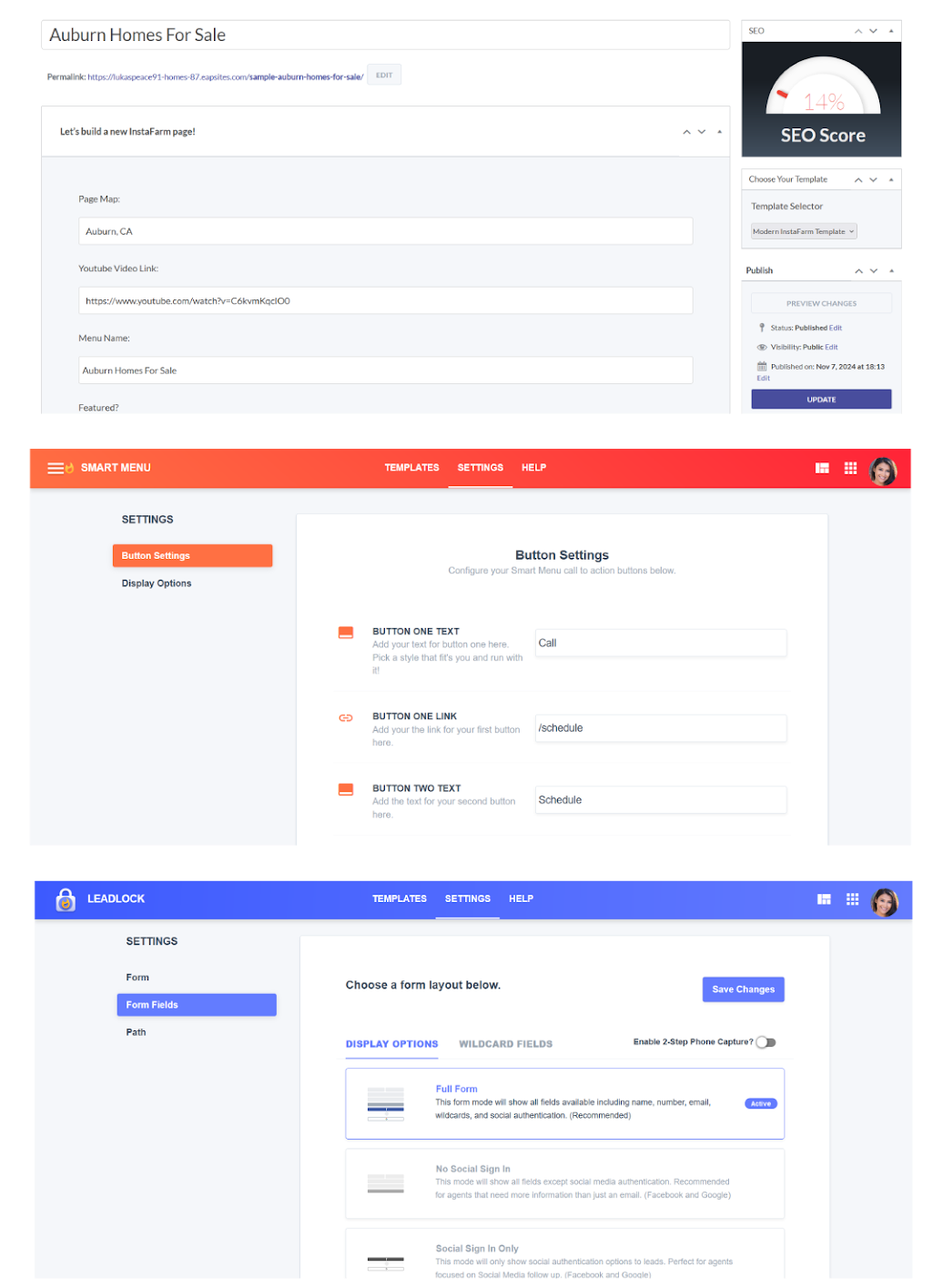
Standout features
- Instafarm: Showcase your expertise and capture leads. With its Instafarm app, easily create pages for any neighborhood, community, or niche.
- Easy SEO: This new feature of Easy Agent Pro is an AI-driven SEO companion that helps you optimize your site by prioritizing tasks based on your strategy and availability.
Coffee and Contracts: Best for social media marketing

- Trendy design and well-written copy
- Templates and scripts for engagement
- Monthly content calendar
- Useful and stylish print templates
- No free trial
- No third-party integrations
- No automated posting
- No in-app template editor
- No print-on-demand options
of
Why I chose Coffee and Contracts
Coffee and Contracts keeps things simple and focuses on helping you save time by giving you the marketing tools and content you need for your business. This includes customizable templates so you don’t have to start from scratch, done-for-you campaigns tailored to your business and target audience, checklists, flyers, printable material, email campaigns, and more.
Other tools and resources you’ll get include a network of over 5,000 agents sharing tips and referrals, weekly trainings consisting of strategic planning, custom content planners, and weekly reel trends. The Stories templates, hilarious Broke Agent memes, and Reels scripts with trending audio are all about getting those algorithms to work in your favor. Coffee and Contracts is like the secret sauce for social media success, serving up awesome content that’ll make your Instagram the one everyone else is jealous of.
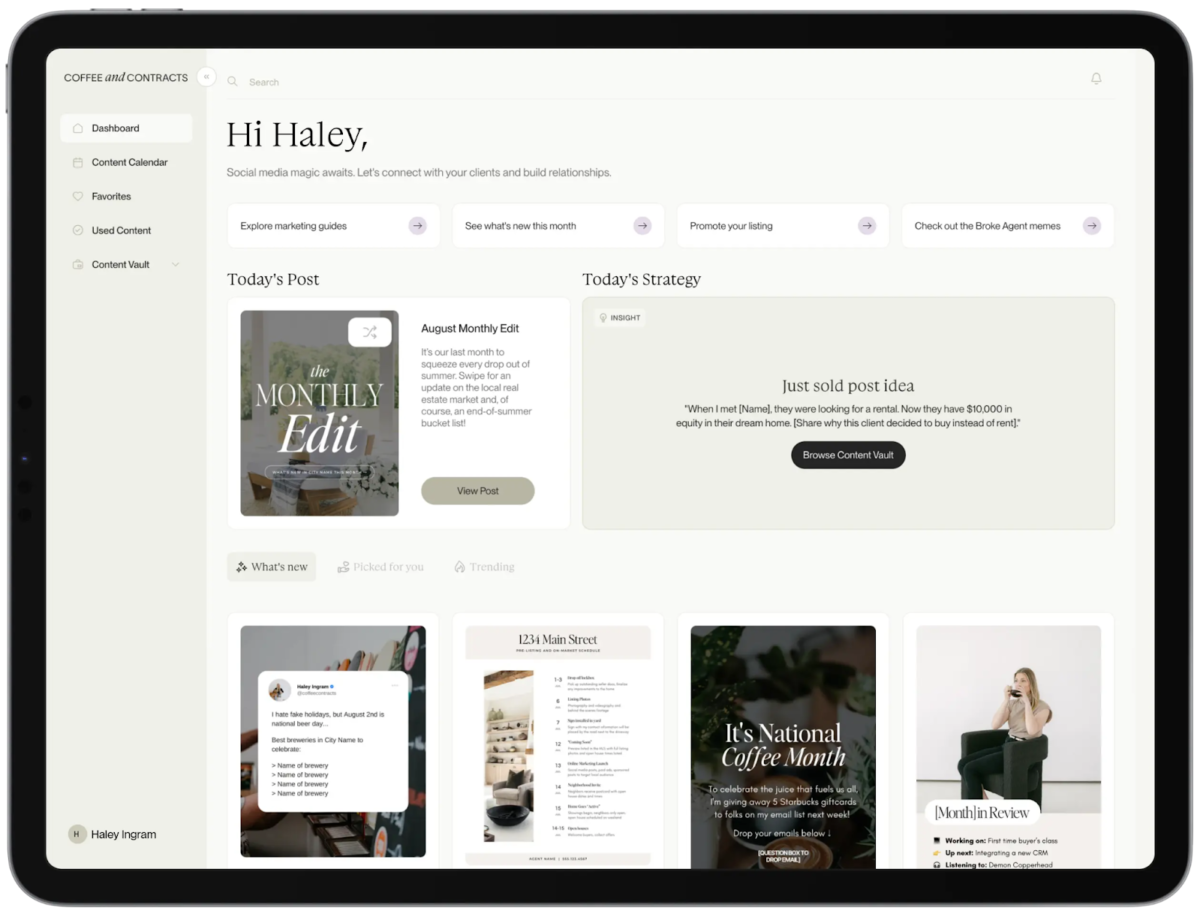
Standout features
- Monthly content calendar: Specifies what and when to post on various social networks. It could enhance user experience by adding autoposting features.
- Prewritten email newsletters and lead magnets: Offers prewritten templates for email newsletters, including checklists, local event calendars, open-house guides, and a preferred vendor packet. These templates are as visually appealing as the social media templates, featuring elegant designs and well-crafted copy.
Real Geeks: Best real estate IDX website builder

- CRM mobile app
- Automated email drip system
- AI-powered SEO fast-track
- SMS autoresponders
- No print mail solutions
- No live chat and 24/7 customer support
- Lack of customization in templates
- Too rigid for tech-savvy agents
of
Why I chose Real Geeks
Real Geeks shines as a platform for real estate builder websites. With its entry-level plan, quickly build an IDX-enabled website using its templates. It features custom capture forms to enhance lead volume and exclusive page aesthetics. Ideal for both solo agents and larger brokerages, its Agent Landing Pages help build individual brands, allowing team members to generate leads easily. Overall, it’s a great budget-friendly option for real estate website building.
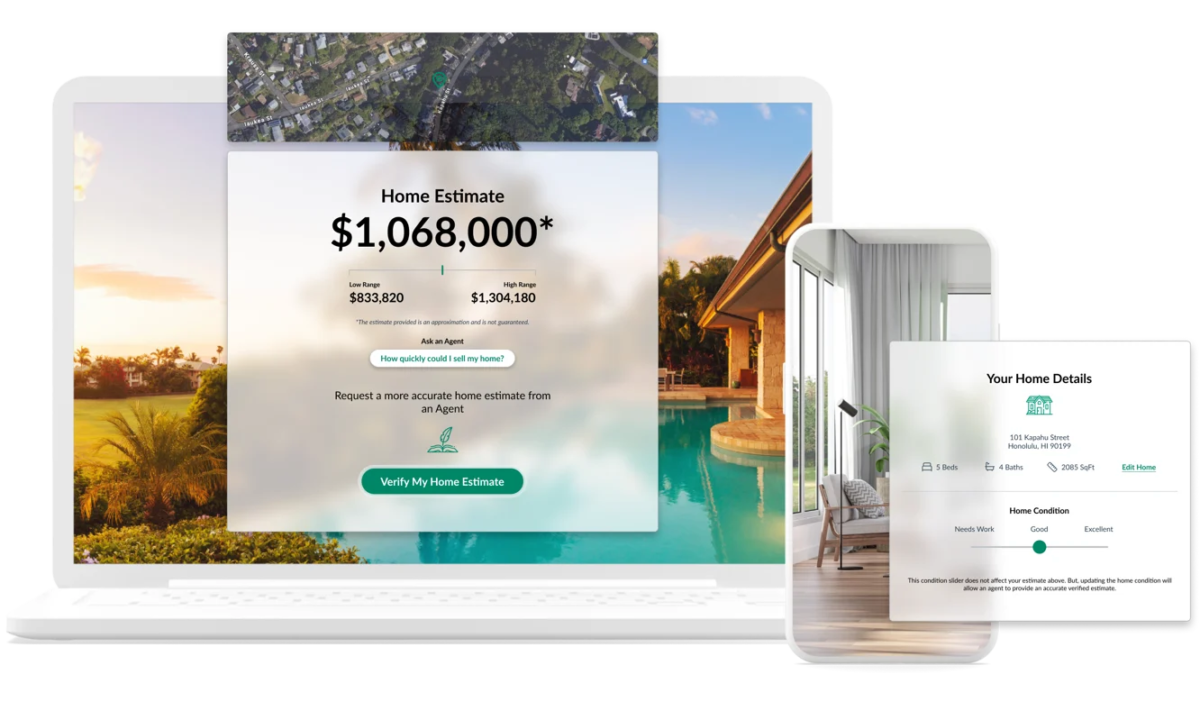
Standout features
- AI-powered SEO fast-track: AI-generated pages are continuously added to your sitemap with fresh MLS content, helping search engines like Google boost your site’s rankings and visibility.
- Automated email drip system: Each lead in your system receives timely follow-ups, keeping the conversation active and your brand in their minds.
-

Learn more:
Check out our review of Real Geeks to dive deeper into these features.
Agent Image: Best website builder for premium image branding

- Track record of success with high-profile clients
- Low recurring costs
- Provides features and functionality to help generate and capture more leads
- No transparency on pricing as it’s not provided up front
- CRM is available, but must be purchased separately
- Initial upfront costs can be high, especially for newer agents
of
Why I chose Agent Image
If you’ll be selling high-end homes or otherwise want to market to high-profile clients, it’s hard to go wrong with Agent Image. With Agent Image, you’ll be able to create highly visually stunning websites that will ooze luxury and professionalism. Agent Image has a track record of working with many successful and well-known clients, including Allure Realty, Chase Rogers, Joyce Rey, Williams & Williams, and more. So just imagine what it can do for you!
In addition to being able to help you create a high-profile website, Agent Image can help with SEO optimization to drive more traffic to your site. Pay-per-click advertising can also help keep your costs down by allowing you to pay only for clicks. At the end of the day, Agent Image is an excellent choice for agents specializing in the luxury market and those who want to place an emphasis on highlighting a personal brand and market expertise.

Additional Features
- IDX websites: With an IDX website, you can make use of interactive maps, search tools, widgets, marketing automations, and more.
- Digital marketing tools: This includes pay-per-click advertising and SEO tools to ensure that your website gets more search visibility, more site visitors, and the obligation to only pay for ads that people click on, something that can reduce your expenses and cost per lead.
Luxury Presence: Best for custom website design & brand development
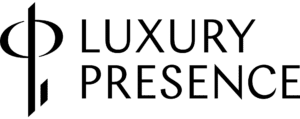
- Stunning selection of website templates
- Fully customized branding
- Custom marketing tools, including lead capture
- Full-service marketing agency available
- Entry-level DIY solution available at a cost-savings
- Cost can be prohibitive
- No email marketing features
- No live chat support
- Setup can take a longer time
- Minimalist designs
of
Why I chose Luxury Presence
Some of the coolest real estate websites out there right now are made by Luxury Presence. If you’re diving into the luxury market, this site builder is the way to go. Its award-winning, customizable website templates are sleek, chic, and sophisticated — definitely giving off those high-end vibes. You’re gonna love it! And get this: you can team up with its awesome in-house creative crew to nail your vision and whip up a totally unique brand identity.
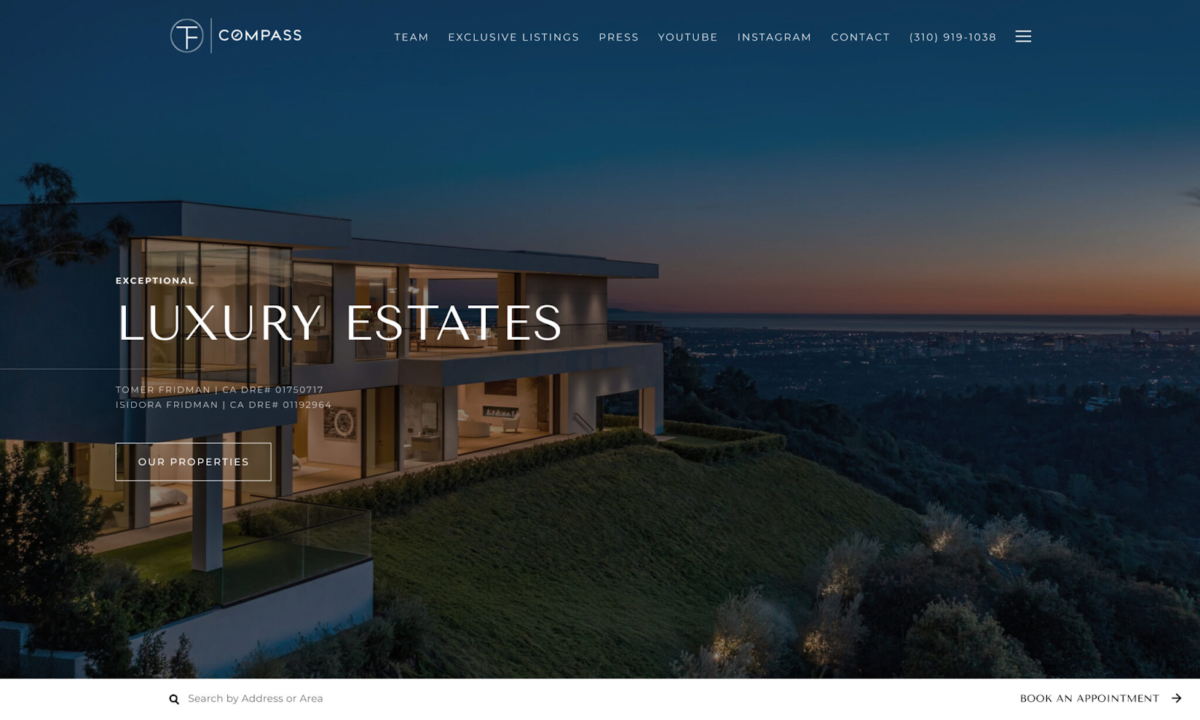
Standout features
- Customizable websites and IDX tools: Luxury Presence offers elegant, customizable websites and IDX home search functionalities designed to assist agents in attracting and converting additional leads.
- AI-powered Tools: The Luxury Presence Copilot AI assistant aids agents in staying organized, overseeing communication, and simplifying tasks, thereby enhancing their daily efficiency.
Agent Crate: Best for templates for print & digital Marketing

- Large selection of marketing templates
- Automated social media posting
- In-app design studio
- Canva-enabled templates for customization
- No third-party integrations
- No mobile app
- No built-in SEO tools
- No print mail solutions
of
Why I chose Agent Crate
Agent Crate is the real deal when scoring sweet value for a real estate digital marketing agency. For about half the dough that Coffee & Contracts hits you with, you get some seriously slick marketing templates, an in-app design studio that’s super fun to use, and customization options that let you spin things. Plus, snag automated social media posting for extra cash if you want to level up.

Standout features
- Stunning design templates: Agent Crate has upped its design game and offers tons of variety in its templates. Choose a design and customize it in Canva for a unique look.
- Social media posting: Add autoposting to social media networks for an additional charge.
Methodology: How I chose the best real estate marketing companies
As a real estate professional, I’ve extensively tested various software platforms, evaluating their features, user experience, and competitiveness. When I share my insights, it’s based on firsthand experience and a solid understanding of what drives results in real estate. To ensure fairness and objectivity, I use an unbiased rubric created by our team of licensed real estate pros and experts. Check out The Close Methodology for more information.
The criteria for this list of real estate marketing agencies are broken down and explained below.
- Pricing (15%):
- We prioritized CRMs that offer robust features in their free plans, providing excellent value without hidden costs.
- General Features (25%):
- We assessed the essential features available, such as reporting and analytics, customizable graphics/design, social media management (comment which platforms), social media ads, third-party integration, mobile app, built-in SEO tools, and landing pages, to ensure they meet the marketing core needs of real estate agents.
- Advanced Features (25%):
- We looked at extra functionalities like real estate-specific templates, email marketing, lead capture forms, marketing checklists, guides, flyers, etc., autoresponders (email/text), and print mail solutions that add significant value to marketing companies.
- Ease of Use (10%):
- Technical skills required to set up and operate the platform were taken into consideration
- Help & Support (5%):
- The availability and format of customer support were reviewed to ensure agents can get assistance when needed.
- Reputation (10%):
- We considered user feedback and ratings to gauge overall satisfaction and real-world performance.
- Expert Score (10%):
- Our team of experts provided an additional layer of evaluation, rating each real estate marketing company based on the overall features, value for money, and ease of use.
Frequently asked questions (FAQs)
What type of marketing is best for real estate?
To effectively market real estate, combine online and offline strategies. Use social media to showcase properties and connect with potential buyers. Share expertise through blog posts and guides, and use email marketing to keep leads informed. Enhance your website’s SEO for better visibility, and use high-quality photos and virtual tours to highlight properties. Targeted ads will reach the right audience, while open houses and community events help build personal connections.
What is the best social media company for realtors?
Choosing the best social media platform for realtors depends on your goals. Popular options include Hootsuite and Buffer for scheduling, while Sprout Social excels at customer connection and reporting. If you’re looking to ensure the right people see your ads, you can use targeted marketing tools that are available on some social media platforms like Facebook Ads. Instagram is perfect for visually showcasing properties. Canva is great for creating appealing posts. Ultimately, it comes down to your objectives, budget, and engagement style.
How do you get leads from Zillow?
To generate leads from Zillow, create a solid agent profile and claim your listings for credibility. Consider joining the Zillow Premier Agent program for better visibility. Use eye-catching photos and detailed descriptions for your listings, and encourage positive reviews from past clients. Respond quickly to inquiries, use Zillow’s analytics for performance tracking, and share your listings on social media to reach a larger audience.
How much should a real estate agent spend on marketing?
I recommend spending enough so that you can reasonably break even on your expenses within a reasonable amount of time. This will be different for everyone, so you should take a good long look at your finances to see what you’d be comfortable with. You should also make sure you have an emergency fund to hold you over for at least three to six months in the event that your investment into marketing does not yield positive results.
Your take
I’m deeply interested in real estate marketing, and I love playing around with all the cool tools on this list. Real estate marketing companies always develop fresh ideas, creating fantastic platforms that allow agents to attract more leads, close more deals, and work more smoothly. Who wouldn’t be excited about that?
So, how about you? What’s in your marketing tech stack? Every agent has their own unique way of using these tools, so I’d love to hear what you’ve got going on in the comments!
The post The 8 Best Real Estate Marketing Companies for 2025 appeared first on The Close.

The Complete Real Estate Marketing Calendar & Holiday Guide
Hitting your annual goals starts with a clear, month-by-month marketing roadmap. That said, I created a real estate marketing calendar outlining one strategic theme each month and key holidays to highlight so you stay on track. Lean on these monthly themes to stay organized, keep […]
MarketingHitting your annual goals starts with a clear, month-by-month marketing roadmap. That said, I created a real estate marketing calendar outlining one strategic theme each month and key holidays to highlight so you stay on track. Lean on these monthly themes to stay organized, keep your audience hooked, and let your brand shine.
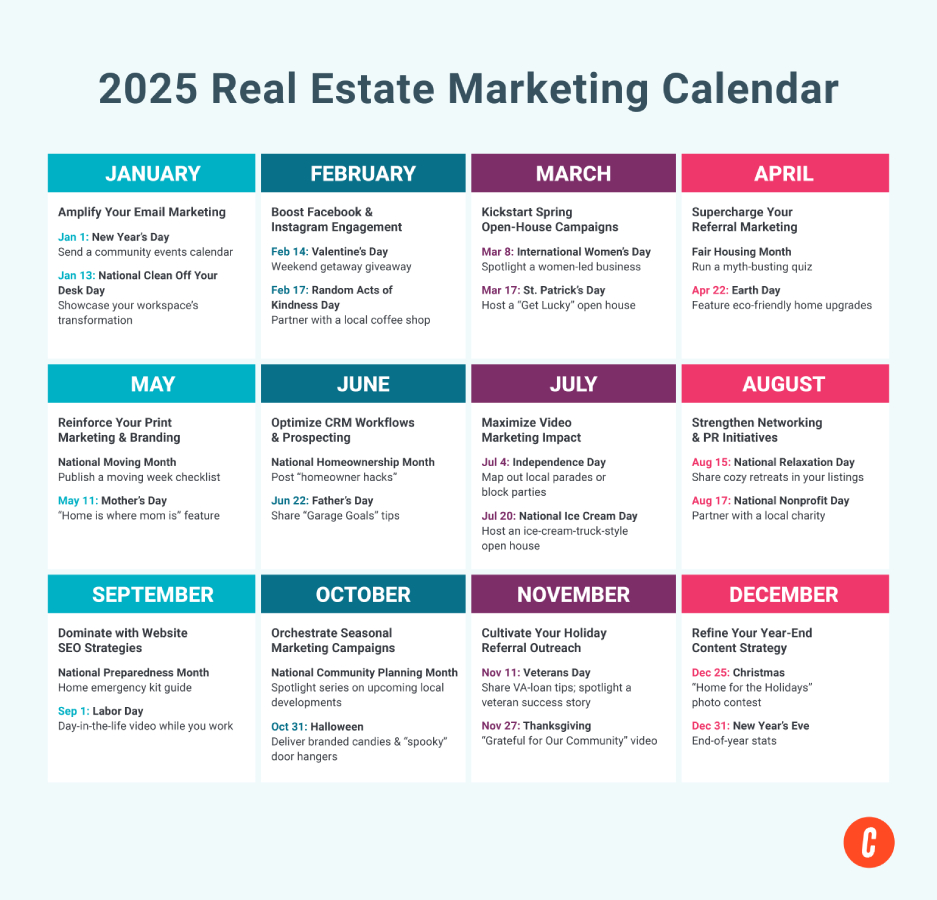
January: Amplify your email marketing
To kick off the year, focus on your email marketing. Email marketing is a highly cost-effective approach that yields the greatest return on your investment of time and resources. Before generating new leads, warm up the ones you already have in your real estate customer relationship management (CRM) system.
- Audit your audience: Remove stale addresses from your CRM and segment contacts by last-interaction date so your first sends reach warm, engaged audiences.
- Automate strategically: Set up new drip campaigns to optimize your marketing efforts. The first one can be called “New Year, New Home Goals.”
- Repurpose then multiply: Turn your drip campaigns into a short monthly newsletter, then slice the quotes and tips into 3-5 social media posts. One real estate newsletter idea, three channels.
-

Holiday highlights:
- January 1: New Year’s Day — Send out a community events calendar to everyone on your list. Make it a downloadable PDF and send it out each month. Need more ideas? Check out our guide on New Year marketing ideas.
- January 13 (Second Monday): National Clean Off Your Desk Day — Tackle that clutter and share a quick before-and-after shot of your workspace on social media. Encourage clients to start fresh in 2025 by decluttering their homes, too!

February: Boost Facebook & Instagram engagement
Now that you’ve freshened up your CRM and your email engine is humming, it’s time to branch out into social, specifically Facebook and Instagram, to meet prospects where they scroll.
- Refresh your bio: Clean up your Instagram bio.
- Update your cover photo: Choose a brand-new Facebook cover photo.
- Define your content pillars: Choose three post themes (e.g., real estate tips, plus two personal topics), so followers receive expert advice and get a glimpse of the person behind the posts.
-

Holiday highlights:
- February 14: Valentine’s Day — Love is in the air, so lean into it with a weekend getaway giveaway! Get your followers on social media to participate along with your email list. You can keep it local with a resort dinner package. Read our Valentine’s Day marketing guide for more ideas.
- February 17: Random Acts of Kindness Day — Partner with a local coffee shop to hand out “Home Sweet Home” latte coupons. It’s a small gesture that shows you care.

Want to make your life easier? Agent Crate is a library of social media posts, landing pages, and instant downloads that align perfectly with February’s push to boost Facebook and Instagram engagement. With thousands of on-brand templates and a members-only dashboard, you’ll never run out of fresh content ideas.
March: Kickstart your spring open-house campaigns
Spring is officially in the air, and open house season is heating up! Now is the time to invest in your marketing and branding around each event.
- Farm your neighborhood: Launch a door-to-door campaign announcing your upcoming open houses and build buzz in your key ZIP codes.
- Circle prospect for maximum leads: Call or drop “just listed” flyers to past clients and high-potential leads.
- Polish your presentation materials: Refine both your listing pitch and comparative market analysis so you can address objections on the spot.
-

Holiday highlights:
- March 8: International Women’s Day — The best way to empower women in your community? Spotlight a women-led business or a female agent on your team with a mini-interview post.
- March 10: Daylight Saving — How often do you get a chance to create a meme with “If I Could Turn Back Time” by Cher? This is that time.
- March 17: St. Patrick’s Day — If you want something festive and fun, host a “Get Lucky” open house with green decor accents and shamrock-shaped cookies.

April: Supercharge your referral marketing
The busy season is ramping up, so now’s the time to rev up your referral marketing engine. After all, referrals are often an agent’s top lead source.
- Nurture your sphere of influence authentically: Reach out with genuine check-ins instead of generic “referral” asks.
- Collect and showcase social proof: Send a quick testimonial request after every closing, then highlight reviews on your social media.
- Optimize your CRM data: Revisit your CRM to ensure you have the best emails possible to drive referrals and repeat business.
-

Holiday highlights:
- All April: Fair Housing Month — Share your commitment to equitable housing or run a light quiz on your socials about fair housing.
- Apr 1: April Fools’ Day — Share some believable home-selling myths and then set the record straight.
- Apr 10: National Siblings Day — Post pictures of you and your siblings, preferably when you’re all young. The more awkward your childhood photo is, the better.
- Apr 22: Earth Day — Feature eco-friendly home upgrades (e.g., solar panels, rain gardens) with a quick video tour. Your green tips will surely resonate with eco-conscious homeowners.

May: Reinforce your print marketing & branding
May is all about broadening your print presence and keeping your real estate branding top of mind.
- Launch a real estate postcard campaign: Send branded postcards announcing your recent sales or newly listed homes in your farm area.
- Upgrade your real estate yard signs: Ensure that yard signs, riders, and “sold” boards all consistently display your current logo, colors, and messaging.
- Audit your print collateral: Take stock of real estate business cards and brochures. Refresh anything that no longer reflects your brand.
-

Holiday highlights:
- All May: National Moving Month — Publish a “Moving Week checklist” infographic that your clients can screenshot, save, and share.
- May 7: National Teacher Appreciation Day — How can you support your local teachers? If you contact your local schools, they will have some ideas!
- May 11 (Second Sunday): Mother’s Day — Share a favorite memory or photo of your mom in “her” space and invite clients to do the same.
- May 26: Memorial Day — Offer a patriotic open-house barbecue or community picnic. It’s a relaxed way to meet prospects and honor the holiday’s spirit.

June: Optimize CRM workflows and prospecting
Prune stale contacts, update your SMS lists, and weave genuine client testimonials into your drip campaigns for maximum impact. And, if your current CRM feels clunky or you’ve barely used it this year, explore a platform you actually enjoy.
- Share a mid-year market update: Send a snapshot of local trends to re-engage your database.
- Call top prospects: Block out time to check in with high-value contacts personally.
- Mail targeted letters: Drop handwritten or branded print letters to your hottest leads.
-

Holiday highlights:
- All June: National Homeownership Month — Post some “Homeowner Hacks” on TikTok or Instagram Reels. This can include swapping out air filters, DIY landscaping, or any other improvement that enhances curb appeal.
- June 7: National Donut Day — Grab a few dozen donuts and put together a sweet pop-by gift for your favorite clients, past clients, and even a few vendors. You’ll be delivering smiles galore!
- June 8: National Best Friends Day — Want a fun idea? Launch a “Refer Your Bestie” contest where past clients tag friends for a chance to win a gift card.
- June 22 (Third Sunday): Father’s Day — Share “Garage Goals” tips or dream-man-cave inspiration in a short blog post.

Have you found the right CRM yet? Market Leader automates lead follow-up with text and email alerts so you never miss a hot prospect during your mid-year outreach push. Its intuitive dashboard and drip-campaign tools let you weave genuine client testimonials into every workflow.
July: Maximize your video marketing impact
Here’s an uncomfortable truth for many agents: Video marketing is now a critical part of social media and online marketing. Prospects want to get to know you before working with you, and they want to see you flex your marketing muscles online.
- Create quick listing tours: Use your phone to film 30- to 60-second walkthroughs that highlight one key feature per clip.
- Share daily Stories and Reels: Post behind-the-scenes footage of your office life and staging setups to keep your audience engaged in real-time.
- Blend education with entertainment: Mix in market updates or “3 Tips in 30 Seconds” segments alongside fun, personality-driven content to build trust.
-

Holiday highlights:
- July 4: Independence Day — Map out local Independence Day parades or block parties, then send a “July 4 VIP” email to your leads and clients.
- July 18: Get to Know Your Customers Day — This day is perfect for sharing a client testimonial. Post a video of your clients gushing over how wonderful you are.
- July 20: National Ice Cream Day — Host an ice-cream-truck-style open house with branded cups or cones.

August: Strengthen networking and PR initiatives
It’s the end of the summer, and now is the perfect time to focus on how to network and level up your reputation as an agent during the last few months of the year.
- Join local groups: Attend mixers or neighborhood associations to forge genuine connections and uncover referral opportunities.
- Host a community event: Organize a casual happy hour or charity drive at a local spot.
- Leverage press mentions: Once you score a local media feature, add an “As Seen In” badge to your website, email signature, and social posts to boost your credibility.
-

Holiday highlights:
- August 9: National Book Lovers Day — Have you read a book you swear by that’s changed your perspective and helped you grow? Share your book and briefly describe how it’s impacted your life. You can create a social media post and share it with your email list.
- August 15: National Relaxation Day — Help potential buyers see where they can unwind by showcasing your favorite “chill zones” in your current listings.
- August 17: National Nonprofit Day — Partner with a local charity for a donation drive. You can have the drop-off bins at your office or an open house.

September: Dominate with website SEO strategies
Wanna learn how your website can be a 24/7 lead machine? Nail your hyperlocal SEO so you appear when prospects search for “homes for sale near me” before they even consider making a call.
- Run a site audit: Use a tool like SEMrush to spot broken links, missing meta tags, and slow pages.
- Optimize your Google Business profile: Keep your hours, photos, and Q&A information up to date to stay visible in local map results.
- Target neighborhood keywords: Research phrases like “downtown lofts” or “suburban starter homes” and weave them into your posts.
-

Holiday highlights:
- All September: National Preparedness Month — Create a “Home Emergency Kit” downloadable PDF and offer it in exchange for email sign-ups. It’s practical, valuable, and grows your list.
- September 1: Labor Day — Create a short “day-in-the-life” video showing how hard you work for clients.
- September 22: Car-free Day — Create a fun video for social media of you as a real estate agent trying to do your job without using your car. Cue the laughter!

If you need help with your site, Agent Image builds SEO-friendly, IDX-powered websites that turn casual visitors into qualified leads, perfect for your September goal of dominating local search results. Each site is custom-designed to showcase neighborhoods, optimize property pages, and boost your Google ranking.
October: Orchestrate seasonal marketing campaigns
Holidays and family gatherings are just around the corner! Plan your fall promotions now so you’re not scrambling at the last minute.
- Send autumn real estate door hangers and postcards: Print simple, eye-catching pieces in warm fall tones with an open house invite.
- Host festive neighborhood events: Throw a Halloween trunk-or-treat or a Thanksgiving pie-and-coffee get-together to bring families through your listings.
- Spark conversation on social: Post a fall-themed poll or invite followers to share their pumpkin-decor photos, then showcase the best responses.
-

Holiday highlights:
- All October: National Community Planning Month — Write a spotlight series on upcoming local developments (e.g., new parks, schools) and why they matter to buyers.
- October 31: Halloween — Deliver branded candy to your farm with some fun, Halloween-themed door hangers.

If you need help planning your real estate content calendar, Coffee & Contracts delivers a complete marketing toolkit — printables, email series, and post templates. This way, you can plan October’s seasonal promotions without struggling to find assets.
November: Cultivate your holiday referral outreach
’Tis the season to nurture relationships. Focus on thoughtful gestures that show you care about people first and business second.
- Send personalized real estate thank-you notes: Handwrite a brief message recalling a highlight from each client’s year.
- Drop seasonal pop-by gifts: Deliver hot cocoa kits or festive treats with your branding and a warm holiday greeting.
- Host a cozy client gathering: Invite top referrers to a small fireside mixer or virtual holiday toast to celebrate your community and make new connections.
-

Holiday highlights:
- November 11: Veterans Day — Share VA loan tips and spotlight a veteran’s success story as a homeowner.
- November 27: Thanksgiving — Post a “Grateful for Our Community” video montage of clients and local business partners.
- November 30: Small Business Saturday (Last Saturday of November) — This is the perfect time to do a business spotlight. Shoot videos, take photos, and get quotes from one of your favorite local businesses.

December: Review & refine your year-end content strategy
Wrap up the year by auditing your content wins and planning fresh ideas. This positions you as the go-to local expert heading into 2026.
- Audit your top content: Check which posts, emails, and real estate videos generated the most engagement, then focus on those themes.
- Plan your 2026 real estate social media calendar: Sketch out quarterly topics for the following year so you hit the ground running.
- Mix post formats for maximum reach: Repurpose your year-end reports into short videos, infographics, or carousel posts to reach a wider audience across email, Instagram, and LinkedIn.
-

Holiday highlights:
- December 4: National Cookie Day — Cookies make excellent pop-by gifts! Pair some fresh cookies from one of your favorite local bakeries with adorable gift bags and cards, and you’ll look like an early Christmas elf!
- December 14-22: Hanukkah — Offer a “Light Up Your Home” mini-blog on easy lighting décor. It’s perfect for highlighting cozy living spaces.
- December 25: Christmas — Invite followers to a “Home for the Holidays” photo contest and offer a small gift card prize. Read our guide for more Christmas real estate marketing ideas.
- December 31: New Year’s Eve — Send an email featuring end-of-year stats and a motivational note about fresh starts in 2026. You can include the number of deals you’ve closed and open houses you’ve hosted.

Frequently asked questions (FAQs)
What are the 4 Ps of marketing in real estate?
The 4 Ps of marketing translate to Product (your listings and services), Price (commission rates and home values), Place (your distribution channels), and Promotion (your advertising mix). These are all essential in creating a solid marketing strategy.
What should be on a marketing calendar?
Your marketing calendar should outline monthly themes, highlight holiday spotlights for timely campaigns, specify content types, and include publish dates. This will make it easier to schedule, publish, and monitor your posts.
How do I create a content calendar for real estate?
First, define your goals and then brainstorm the type of content you want to create. Some examples are home tour videos, community spotlights, and agent interviews. Then, assign each piece a publish date and channel (TikTok, Instagram, or email). Do this consistently every month so you never run out of ideas to post.
Your take
I hope my real estate marketing schedule has helped you plan for the upcoming holidays and seasons!
Got a brilliant idea to level up this action plan? How’s your marketing strategy performing this season? Share your insights and wins in the comments — I’d love to hear your thoughts and celebrate your success!
The post The Complete Real Estate Marketing Calendar & Holiday Guide appeared first on The Close.

The Top 9 Real Estate Lead Generation Companies for 2025
Are you getting frustrated with leads rarely turning into closed deals? As a licensed broker myself, that’s something I totally get! Fortunately, there are plenty of solutions to this problem, and one of them is working with the right lead generation company. The best lead […]
MarketingAre you getting frustrated with leads rarely turning into closed deals? As a licensed broker myself, that’s something I totally get! Fortunately, there are plenty of solutions to this problem, and one of them is working with the right lead generation company. The best lead gen companies have the capability to generate, manage, and nurture quality leads, provide data insights, and present their data in an easy-to-use interface.
I’ve researched more than a dozen lead generation companies and selected the following as my top picks based on things like pricing, features, customer service, and customer ratings.
- CINC: Best overall for hyperlocal lead generation and IDX websites
- iNCOM: Best website designs for lead generation
- Market Leader: Best for predictable exclusive leads
- Real Geeks: Best for affordable, all-in-one lead generation platform
- REDX: Best for niche leads and affordability
- zBuyer: Best for buyer and seller leads with no long-term contract
- Zurple: Best automated lead nurturing system
- Zillow Premier Agent: Best for capturing buyer leads
- SmartZip: Best for geographic farming
My picks for the top real estate lead generation companies
| Standout Features | Starting Monthly Price | Learn More | |
|---|---|---|---|
 |
|
$899 | CINC Review |
| Visit CINC | |||
 |
|
$54.95 + $250 setup fee | iNCOM Review |
| Visit iNCOM | |||
 |
|
$189 + $10-$50 per lead (for one user only) | Market Leader Review |
| Visit Market Leader | |||
 |
|
$299 | Real Geeks Review |
| Visit Real Geeks | |||
 |
|
$49.99 | REDX Review |
| Visit REDX | |||
 |
|
$400 | zBuyer Review |
| Visit zBuyer | |||
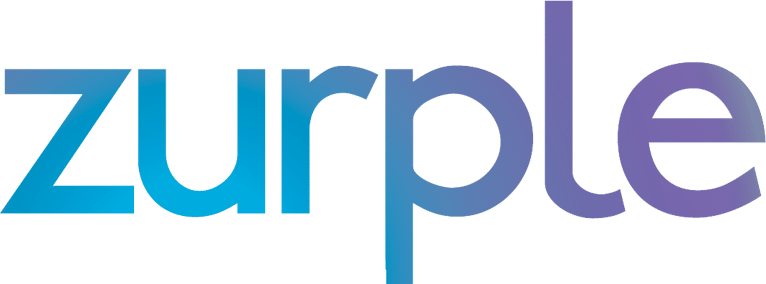 |
|
$309 | Zurple Review |
| Visit Zurple | |||
 |
|
$300 | Zillow Premier Agent Review |
| Visit Zillow | |||
 |
|
$299 | SmartZip |
| Visit SmartZip | |||
CINC: Best overall for hyperlocal leads & IDX websites

- Exclusive buyer and seller leads
- Advertising strategy to drive higher-quality leads
- Easily scalable for teams and brokerages
- Beautifully designed websites
- Cutting-edge CRM and AI nurturing tools
- Relatively high price tag for solo agents
- Don’t own your IDX website
- Overwhelming complex system for some agents
- No customization options
of
Why I chose CINC
-

Starting monthly prices:
$899 for single agents and $1,299 for teams
CINC is my pick as the best overall lead generation company because it offers an all-in-one platform with a wide range of features and functionality. To ensure quality leads, it utilizes proprietary technology to target niche property types within hyperlocal markets. It can also target specific submarkets to factor in things like school districts, geographical landmarks, cultural touchstones, and more.
Other features included with CINC’s all-in-one platform include an advanced customer relationship manager (CRM), IDX websites, lead automations, mobile apps, AI-powered tools, and integrations with various social media websites. Personally, I’m particularly impressed with its CRM — and while it did not make our list of the best real estate CRM’s, I believe it’s worth checking out, considering all of the included tools and functionality offered by the company.
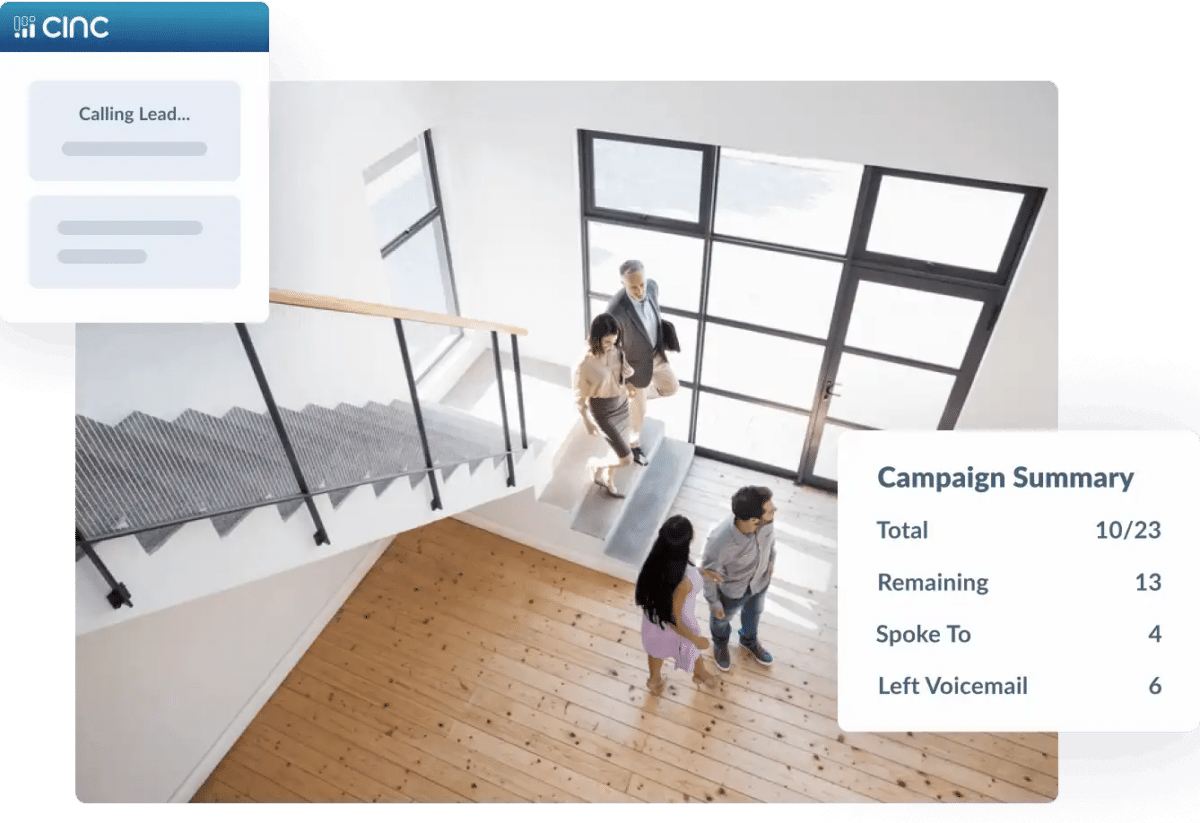
Standout features
- Social media integrations: CINC is a business partner of Meta, something you can leverage to advertise on social media to capture more leads on platforms like Facebook and Instagram. Social media leads typically carry a lower cost, and with CINC, you can target leads based on location and demographic factors. Information obtained from social media leads also tend to be more accurate, since the data is pulled directly from the home seeker’s profile.
- AI-powered tools: With conversational AI, you can get assistance in nurturing leads. It’s essentially a virtual team member that’s available 24/7. The data it collects from conversations is also analyzed, and highly motivated leads will then be passed on to you for additional follow-up. This is why CINC landed on our list of the best real estate AI tools for its lead generation and nurturing capabilities.
- Lead automations: Automated tasks can be set for sending emails, following up with conversations you’ve had with clients, and more.
CRM: CINC’s advanced CRM allows you to manage all of the contact information you obtain to effectively and efficiently make lead management as simple as possible. Leads can be routed to specific agents, begin drip campaigns, and more.
iNCOM: Best website designs for lead generation

- Free unlimited web pages
- Highly customizable web designs
- Free upgrades for the life of the product/service
- Some services, such as SEO marketing, require a minimum 12-month commitment
- Some services not available in all areas
- No live chat options
- May require you to bundle multiple products and services to meet your business needs
of
Why I chose iNCOM
-

Starting monthly prices:
$54.95 + $250 setup fee for agents
If you’re a relatively new agent and want to focus on generating leads from your website, iNCOM is a fantastic option to consider. Regardless of your experience in the industry, you’ll be able to get up and running quickly with a fully functioning website. Once that’s complete, iNCOM provides a number of tools to help you maximize your lead generation efforts.
SEO tools, for instance, can help boost your website’s visibility in search engines such as Google, Bing, Yahoo, and AOL. You’ll also get a structured SEO plan which includes a full website assessment, keyword research and development, meta tag building, content building, copywriting, and much more. In addition to these services and website analytics, iNCOM also has a CRM to help manage the leads being generated.
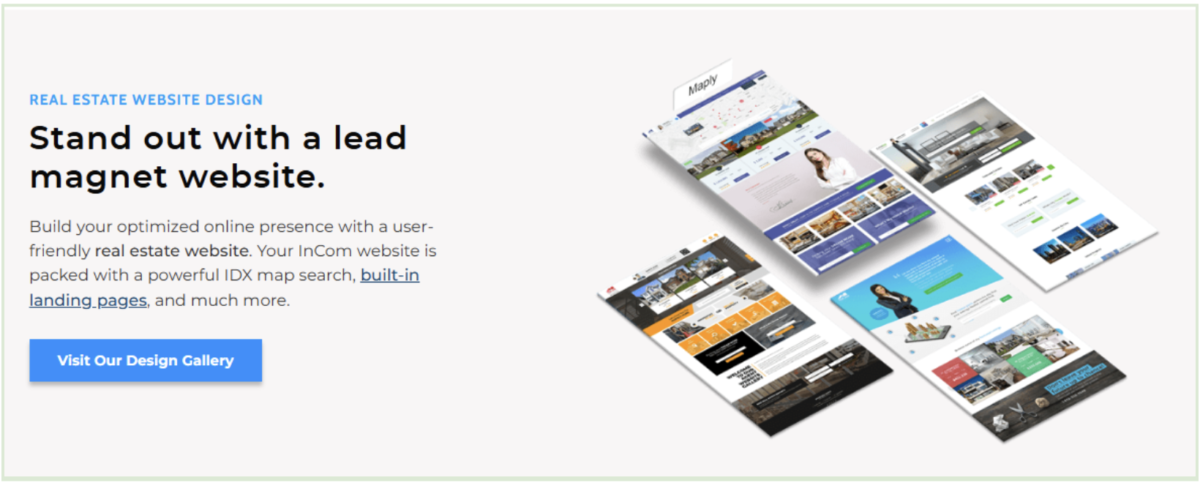
Standout features
- IDX functionality: iNCOM has IDX listing syndication that can drive additional traffic to your company’s website. It makes it easy for your leads to view properties listed in the MLS, and ensures they have the most updated information as listings are automatically uploaded and updated.
- Automated reporting and analytics: Gain crucial insight into your website’s performance and the effectiveness of your marketing efforts. Automated reports allow you to track things like user engagement and historical web traffic.
- Virtual tours: Allow your listings to stand apart from the competition by implementing virtual tours on top of standard photos of the property.
Market Leader: Best for exclusive leads

- Predictable number of exclusive leads every month
- Network Boost social media leads
- A great mobile app
- CRM and automated nurturing tools included
- Dated IDX lead generation websites
- Unsophisticated CRM compared with competitors
- Higher funnel leads
of
Why I chose Market Leader
-

Starting monthly prices: Basic Package:
$189 + $10 to $50 per lead (for one user only); $329 for teams
Having multiple agents battle over the same pool of leads can seriously lower your chances of converting leads into clients. However, Market Leader promises exclusive local leads every single month from your target area. With that said, lead inventory is naturally going to be limited, so you’ll need to visit the Market Leader website to check availability in your area first.
Market Leads uses several different lead generation solutions. For example, Leads Direct helps drive consumers to your company’s website. HouseValues, on the other hand, helps capture motivated sellers via targeted ads that direct seller prospects to Market Leader’s landing page and HouseValues.com, and buyer leads to a personally branded, IDX search-enabled site. Once a lead gives their information, it’s automatically populated in the Market Leader CRM, and then you take over with nurturing and conversion. Finally, Network Boost captures information from social media, and you’ll also get help with converting your leads with drip campaigns and automated lead nurturing tools.
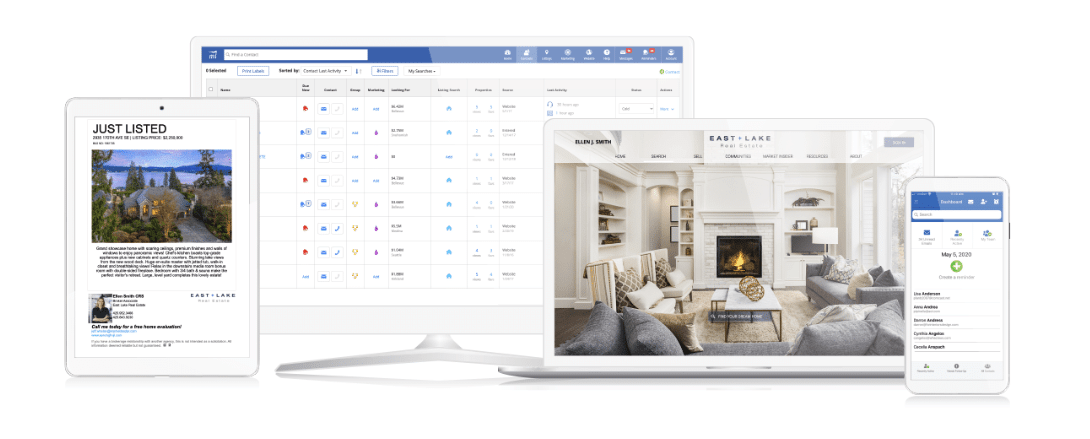
Standout features
- Automated lead engagement: Market Leader utilizes an engagement co-pilot, which can create listing alerts and send automated emails on your behalf depending on which stage of the home buying process your leads are in.
- CRM integration: Market Leader’s CRM can automatically add contact information for your leads, which you can then further engage via automated lead nurture campaigns, receiving alerts on when you can follow up.
- Mobile app: Market Leader’s mobile app allows agents to promptly and efficiently respond to new leads using real-time push notifications and contact records, including lead insights. Email activity is synchronized with your desktop CRM, ensuring you never miss critical updates.
Real Geeks: Best for affordable, all-in-one lead generation platform

- Exclusive buyer and seller leads
- More affordable than competitors
- IDX website designed for converting real estate leads
- Leads that can be purchased or generated using Facebook marketing tool
- CRM that sends automated texts and emails based on lead’s behavior
- Websites with limited customization options
- Pricey Real Leads PPC management fee
- Limited team and brokerage features
- Extra fees for a la carte tools
- More analytics and lead distribution tool needed
of
Why I chose Real Geeks
-

Starting monthly prices:
$299
Oftentimes, if you want to save money on a product or service, you end up also sacrificing features, functionality, or quality. That’s not the case with Real Geeks. It earned my vote for the best affordable all-in-one platform because it offers tools to help automate your advertising, a CRM to manage your leads and customers, and other tools to help you grow your business.
For example, Real Geeks generates leads using Google and Bing PPC ads to drive seller leads to home valuation pages and buyer leads to IDX websites. Users can generate leads through Facebook ad creation, search engine optimization (SEO), or social media.
In addition, Real Geeks comes with a sophisticated CRM, automated drip campaigns, texting, and top-shelf training and customer support. It also features a behavioral marketing tool called Reactive Responses that can give other companies, such as Zurple, a run for its money. All of these reasons are why Real Geeks made our list of the best real estate marketing companies.
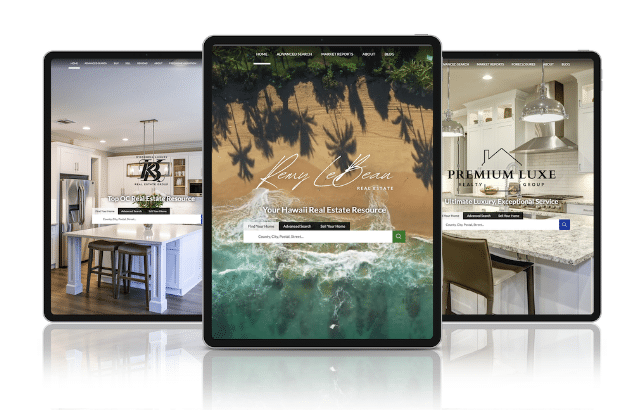
Standout features
- IDX websites: An IDX website can ensure that visitors to your website are given the most updated data available. Its Property IDX, for instance, is updated every 15 minutes.
- Property valuation tools: With EstateIQ, you can provide added value for sellers beyond just an estimated home value. Sellers can get local insights on things like active listings and average days on market. EstateIQ is also more than a valuation tool, as it has additional functionality to nurture leads and convert visitors into clients.
- MoveTo App: This property search solution can allow your leads to easily find properties they love. This data is then shared with you, allowing you to prioritize daily tasks by focusing on leads actively looking at properties.
REDX: Best for niche leads

- Affordable, a la carte pricing
- CRM and auto-dialer (multiline auto-dialer upgrade available)
- Leads verified to not be on the Do-Not-Call list
- Scripts and objection handlers built into the platform
- Verified owner and contact information for all leads
- Significant investment of time required to convert leads.
- Cold calling not the ideal strategy for every agent.
- Nonexclusive leads
- Lower conversion rates than other lead sources
of
Why I chose REDX
-

Starting monthly prices:
$49.99 for FSBO and preforeclosure leads
If you’re looking to specialize in certain types of leads, REDX is a good option to consider. REDX leads include those that have expired, for sale by owner (FSBO), for rent by owner (FRBO), pre-foreclosures, and more. Once you choose the types of leads you want to pursue, REDX will provide you with their relevant contact information.
REDX also helps you connect with more homeowners with its Power Dialer tool — something that automatically checks numbers against the Do-Not-Call list — settings to help prevent your number from being flagged as spam, and team-wide dialing.
Additionally, with a constantly updated system, you always get a fresh list of real estate agent leads in your area. REDX offers multiple lead types and provides tools, training, and scripts to convert leads into clients. If you want to become a listing agent and are willing to make calls, REDX gives you the best value.
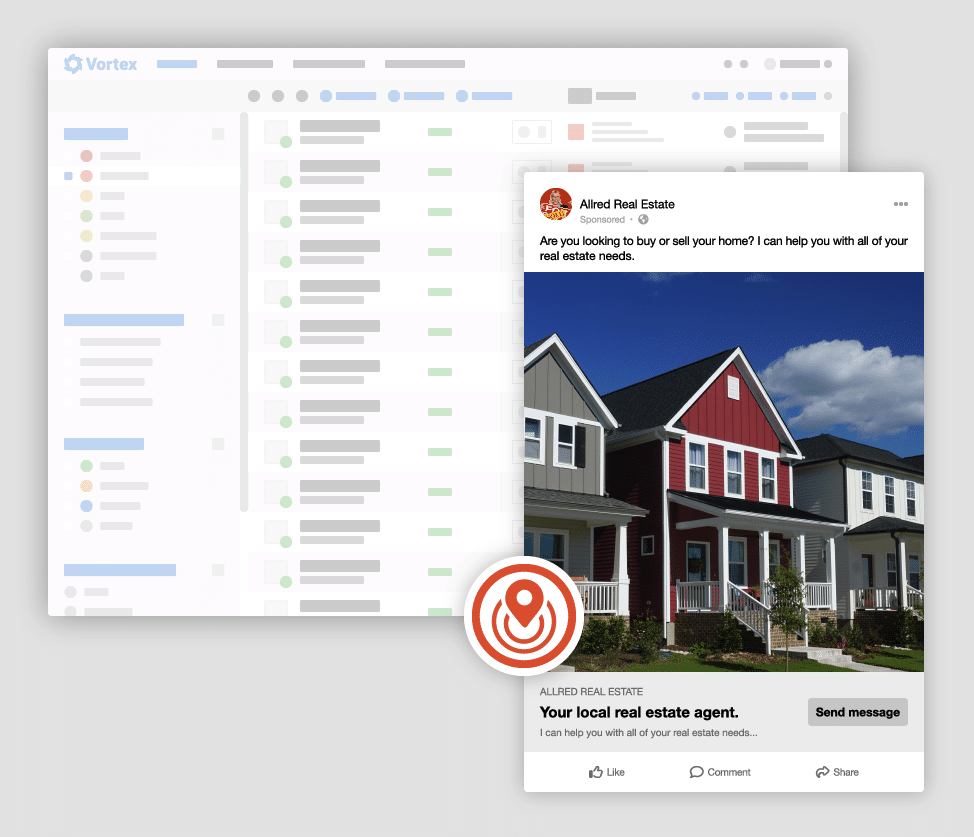
Standout features
- Postcards and direct mail: With REDX, you can send targeted mailers to your preferred leads with templates you can use to save time from designing them yourself.
- Social media ads: With Ad Builder, you can create custom ads or use pre-built templates to get up and running quickly.
- Professionally managed social media: Brand Builder can allow you to provide custom video editing and social media management. You’ll also get AI tools for scripts and idea generation.
zBuyer: Best for affordable leads with no contract

- Verified leads and free replacements for bogus leads
- No yearly contract
- Reasonably priced
- Mix of high-and low-funnel leads
- Free prospecting leads
- Leads can “sell out” or become limited in number
- Nonexclusive leads
- No IDX website
of
Why I chose zBuyer
-

Starting monthly prices:
$400
zBuyer can be well suited for you if you’re unsure if you want to focus on buyer or seller leads. It can also be a great fit if you need both. It requires no long-term commitments, and can connect you with buyers and sellers, all at an affordable price. It can also provide a customized package by selecting the amount, type, and location of client inquiries depending on your business.
Perhaps a unique feature of zBuyer is that it offers a type of guarantee for the contacts and properties it provides to you. If, for any reason, you are not satisfied with a lead, you can discontinue the service or have that lead replaced with another one, no questions asked.
zBuyer uses innovative analytics to uncover early indications of interest in selling or buying. The company offers targeted sellers a chance to discover their home’s worth and potentially a cash offer. While the leads may not necessarily be exclusive, it says it works hard to “limit their exposure.”
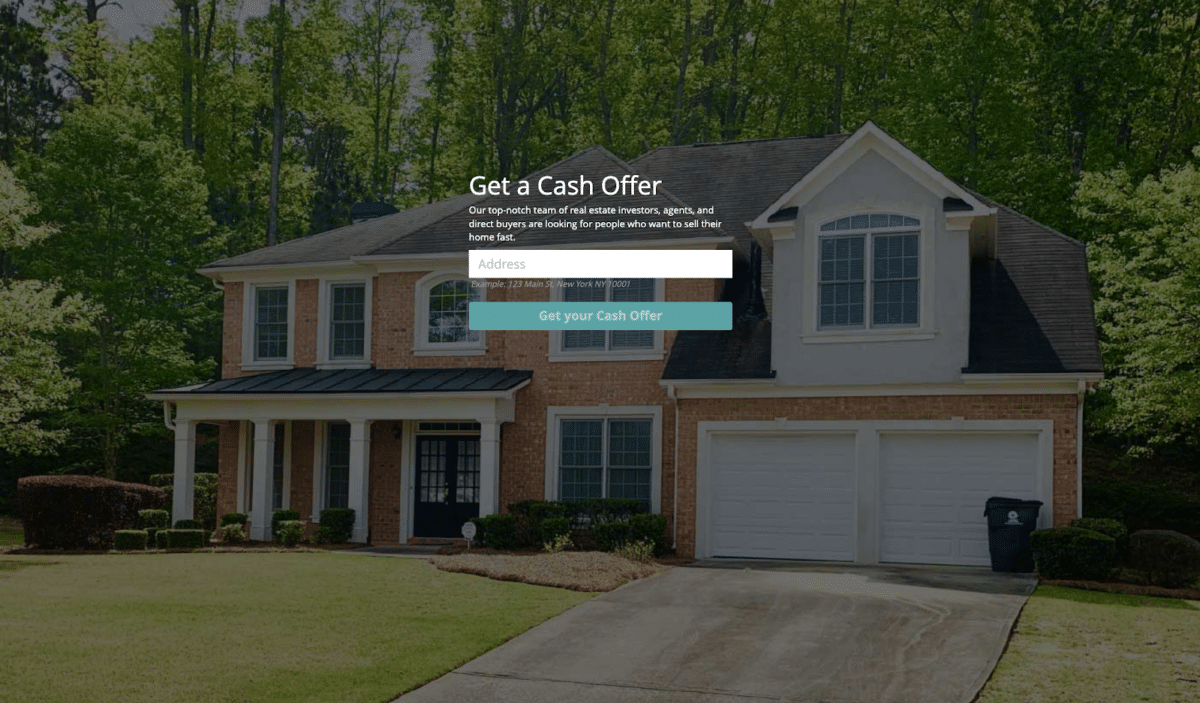
Standout features
- Real-time connections: Receive new leads in real-time as you’ll get messages from buyers and sellers instantly to your CRM, email, and zBuyer mobile app.
- Fully compliant 1-to-1 connections: You won’t have to worry about reaching out to individuals on a Do-Not-Call list. The leads you receive have already specifically opted in to receiving communications from real estate professionals, including automated messages.
- Mastermind group: Get assistance with your real estate business by joining thousands of other agents who can share best practices, tips, and methods that have worked for them.
Zurple: Best automated lead nurturing system

- Exclusive buyer and seller leads with a robust profiling and nurturing system
- Easy-to-use platform
- Social media scheduler and video messaging
- Behavior-based email and SMS conversations
- Able to easily manage large teams and brokerages
- Confusing pricing
- Customer service needs improvement
- Nonrobust training
- Six-month contract required
- Limited integrations with other software
of
Why I chose Zurple
-

Starting monthly prices:
$309; Additional Sites: Basic package at $309 + $100/month per site
If you want to have a bit of a hands-free approach to lead generation, Zurple can help with automatically engaging leads with behavior-driven personalized messages. Leads can be captured when individuals create an account on your IDX-powered website while viewing MLS listings, as well as from social media ads.
Zurple promises to provide a consistent flow of leads each month. You’ll get leads local to your area, exclusive to you and not shared with other agents. You’ll also get data insights into each lead’s preferred listings, price ranges, and geographic locations. Zurple also automatically provides leads with a home valuation estimate as a way to provide value-add in order to further facilitate a warm follow-up.
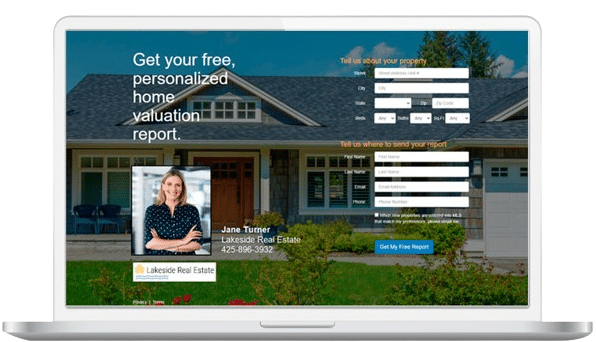
Standout features
- Behavior-led outreach: These highly engaging, sophisticated outreach campaigns use email, text messages, MLS market updates, and new listings to adjust based on the lead’s behaviors.
- Lead-capturing websites and integrated CRM: Instead of one branded website and IDX feed, Zurple’s websites are more like landing pages designed to capture data from site visitors. This feature separates your agent site from these landing pages, driving more leads directly to your CRM.
Zillow Premier Agent: Best for buyer leads

- Able to capture buyer leads earlier than competitors
- Warmer leads than competitors
- Zillow Live Connections that puts you in contact with leads over the phone
- Behavioral insights on buyers
- Weak customer service
- Very basic CRM
- No exclusive lead
- Price per lead higher than other platforms
of
Why I chose Zillow Premier Agent
-

Starting monthly prices:
$300-$1,000 depending on your location
Zillow Premier Agent captures buyer leads before the competition, with 93.2 million monthly visitors starting their home search directly on Zillow. It sells advertising space in specific ZIP codes and transfers leads to your CRM or Zillow’s, leaving nurturing and conversion to you.
What does that mean for you? Well, since so many buyers start their search on Zillow, by the time they end up clicking on a Google or Facebook ad from another lead generation company, chances are they’re already talking to a Premier Agent. Advertising on Zillow gives you a first shot at these leads.
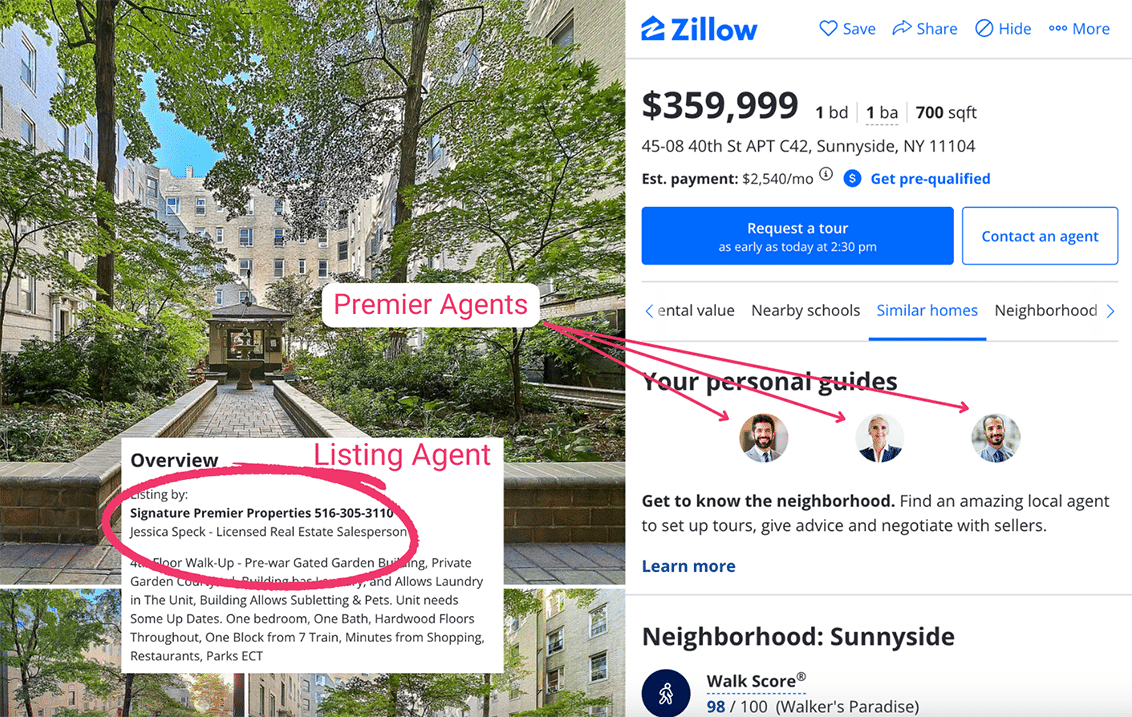
Standout features
- Generates warmer buyer leads than other companies (yes, really): Zillow’s advertising targets buyers actively searching for homes, unlike competitors capturing leads from casual browsing on Facebook. While not every Zillow lead will close quickly, their purchase intent is generally higher.
- Client communication resources: This Zillow tool helps real estate agents keep track of their clients. It lets agents know when they have a new client or if someone wants to see a house. Agents can also put their clients into groups, like people who want to buy a home or people who want to sell one. The tool can also keep records of texts, emails, and calls with each client to remember what they talked about.
SmartZip: Best for geographic farming

- Predictive analytics that identifies likely sellers before other lead generation companies
- Best-in-class marketing and nurturing tools to convert seller leads
- Easy upgrade to Offrs with buyer leads on the same smart data and CRM
- Home valuation landing pages
- Nonexclusive leads and generally top-of-funnel
- Not recommended for new agents
- More expensive than most competitors
of
Why I chose SmartZip
-

Starting monthly prices:
$299 (requires 12-month contract)
SmartZip’s near-magical ability to predict likely sellers is complemented by its suite of marketing tools, which are highly effective in nurturing and converting these leads. This makes SmartZip a clear choice for seller leads. SmartZip’s predictive analytics technology combs through millions of data points to identify likely sellers six to 12 months before they’re ready to sell.
SmartZip analyzes consumer data (from places like credit card companies), market data (from your MLS), and demographic data, predicting which homeowners in your targeted region are most likely to sell.
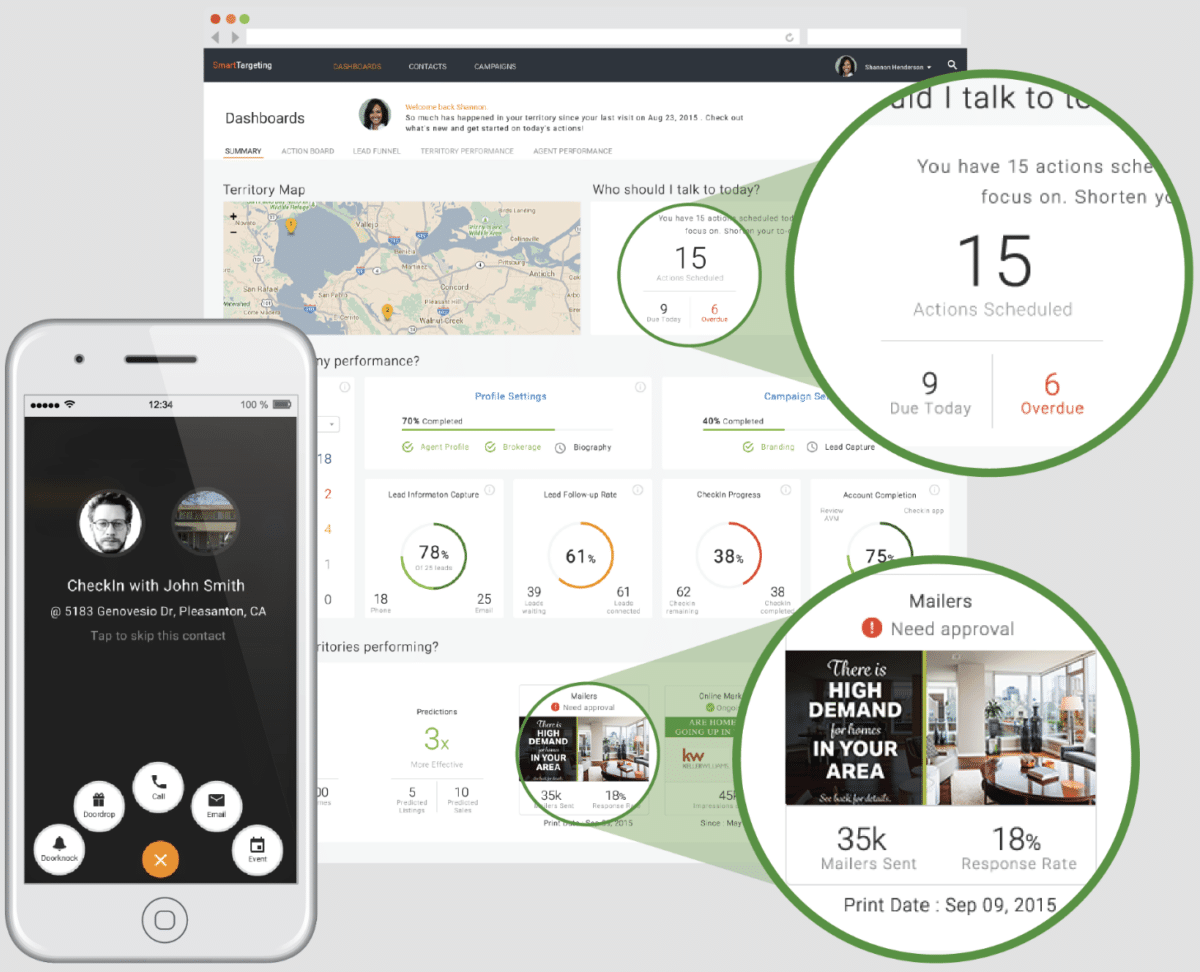
Standout features
- Reach150: Using Reach150, real estate agents can manage their online presence and use favorable testimonials to attract new referral clients.
- Best-in-class marketing and nurturing tools: Its CheckIn app tells you who to follow up with every day. You also get home valuation landing pages, automated direct mail campaigns, a comparative market analysis tool, and local trend reports.
Methodology: How I chose the top lead generation companies for real estate
To evaluate the best real estate lead generation companies in this article, I leaned on our team of licensed real estate pros, writers, and editors, who created a weighted rubric to evaluate each company. Our team has spent hours researching dozens of companies and assessing each based on the most impactful elements for agents and brokers. Here are the criteria we based our evaluations on:
- Pricing (20%)
- I looked at the average price per lead for buyer and seller leads, monthly ad management fees, the minimum required ad spend, onboarding fees, and pricing for mandatory tools like CRMs, IDX websites, and automated lead nurturing. I also included whether or not a contract is required.
- Features (25%)
- I evaluated each company’s main features, like lead capture tools, lead management, integrations, and ease of use. If a company required features like a built-in CRM, IDX websites, or automated nurturing, I included those features in my analysis.
- Advanced Features (20%)
- I evaluated whether the leads generated were high-funnel or low-funnel, lead exclusivity, how leads are qualified, lead quality, and how difficult the leads are to convert.
- User Experience (10%)
- The dashboard and user interface are essential factors to consider. If it’s challenging to use or find your way around the platform, you’ll be much less likely to use it.
- Customer Rating (10%)
- I read reviews of the real estate software after I’ve tried it to evaluate others’ experiences compared with my own. I take that additional feedback into account when assessing any software.
- Expert Score (15%)
- I credit any standout features not covered in the above categories.
Read more about our methodology here.
Frequently Asked Questions (FAQs)
How do most realtors get leads?
Successful real estate agents diversify lead generation so businesses don’t live or die from a single source. Paid lead generation, referrals, and organic social marketing are great examples of how real estate agents get new leads. Having a plan for your overall real estate lead generation strategy is essential. Check out our article on the best places to buy real estate leads for more information.
Are real estate lead generation companies worth it?
Paid lead gen strategies are worth it if the ROI is high. For most agents, the commission from one closing can cover the total investment for the year. The upside is that if you’ve covered the annual cost of your lead gen with one closing, any additional commissions are profits. Since lead generation is continuous, you can estimate how much GCI you will make in a year.
How much should you pay for lead generation?
In most markets, the maximum price a real estate agent should be comfortable spending per lead is $200. That seems high, but let’s do a little math together. Let’s say you get ten leads in a week from a real estate lead generation company and convert one into a client. Let’s assume you’re converting 75% of those clients into sales. This metric means you’re closing three monthly transactions out of 40 leads.
For 40 leads a month, you’re paying $8,000 (40 x $200). With the typical home selling for more than $300,000, those three sales gross you $27,000 in GCI (assuming a 3% side). That nets you $19,000 before splits and taxes. Of course, this price changes based on your conversion rates, the typical sale price of a home in your market, and your commission percentage. However, for most agents, $200 per lead is a great benchmark.
One of the best ways to maximize your conversion rates is to find the strategy best suited for your target audience. As one example, our team has compiled a list of ways to generate leads as a commercial real estate agent.
What is the best CRM for realtors?
The best real estate CRM depends on a realtor’s budget, business goals, and preferences. If you’re new to the industry and don’t want to shell out money for paid ones, consider free CRMs like ClickUp and HubSpot. But if you want to invest in paid CRMs, LionDesk, Follow Up Boss, and Wise Agent are excellent options.
Your Take
Are there any top real estate lead generation companies we haven’t covered that you’d like to know more about? Or some feedback on the ones we’ve reviewed? Share your experience in the comments!
The post The Top 9 Real Estate Lead Generation Companies for 2025 appeared first on The Close.

LuxeSF and San Francisco Magazine release their 2023 The Leading 100 list naming the top performers in Bay Area real estate
LuxeSF and San Francisco magazine, in partnership with the respected RealTrends organization, released their 2023 The Leading 100 list on August 17th, which recognizes outstanding top performers in Bay Area residential real estate based on their individual and team dollar sales volume. Compass takes great […]
Marketing
LuxeSF and San Francisco magazine, in partnership with the respected RealTrends organization, released their 2023 The Leading 100 list on August 17th, which recognizes outstanding top performers in Bay Area residential real estate based on their individual and team dollar sales volume.
Compass takes great pride in acknowledging the accomplishments of our 54 agents and teams who have secured a spot on this year’s list – more than any other brokerage in the Bay Area. This achievement stands as a testament to their unwavering dedication, profound industry passion, and their lasting commitment to serving both their field and clients.
Click here to check out the full list of 2023 Leading 100 honorees.
Compass Agents
Andrea Gordon | DRE 01233563
Anson Ip | DRE 01413912
Beth Brody | DRE 00657511
Chao Wen | DRE 02069317
David Welton | DRE 00922957
Erika Demma | DRE 01230766
Heena Joshi | DRE 01998854
Helena Zaludova | DRE 01472256
Isabelle Grotte | DRE 01895115
Jason Hoffman | DRE 01865372
Jessica Branson | DRE 01729408
Josh Rubin | DRE 01995038
Joujou Chawla | DRE 00890002
Julie Garnder |DRE 01431765
Kathy Bridgman |DRE 01189798
Neal Ward |DRE 01052285
Nick Delis | DRE 01209680
Raziel Ungar | DRE 01701234
Renna Shee | DRE 01906557
Scott Dancer | DRE 00868362
Shana Rohde-Lynch | DRE 01079806
Yvonne Yang |DRE 01371905
Zach Trailer | DRE 01371338
Compass Teams
Ardila and Costello Team
Andy Ardila | DRE 02080102
David Costello | DRE 01947195
Bambace Peterson Team
Dana Bambace | DRE 01731448
Mark Peterson | DRE 01977162
The Bellings Brothers
Aaron Bellings | DRE 01915431
Michael Bellings | DRE 01935559
Boyenga Team
Eric Boyenga | DRE 01254725
Janelle Boyenga | DRE 01254724
Brent and Mary Gullixson Team
Mary Gullixson | DRE 00373961
Brent Gullixson | DRE 01329216
Butch Haze Team
Butch Haze | DRE 01140774
Carey Hagglund Condy Team
Carey Hagglund Condy | DRE 01323032
Carol Carnevale, Nicole Aron & James Steele Team
Carol Carnevale | DRE 00946687
Nicole Aron | DRE 00952657
James Steele | DRE 01872027
The Condo Advisory
Justin Goldberg | DRE 01705028
Todd Montgomery | DRE 01875716
Marcus Lee | DRE 01354869
Dana Green Team
Dana Green | DRE 01482454
Frazzano Tse Team
Joe Frazzano | DRE 00982431
Alex Tse | DRE 01386010
The Gina Haggarty Group
Gina Haggarty | DRE 01163760
Jenny MacLeod | DRE 02026724
Judy Citron
Judy Citron | DRE 01825569
Kate McCaffrey Group
Kate McCaffrey | DRE 01355206
Kenny and Jun Team
Kenny Kim | DRE 01107924
Jun Chung | DRE 01781903
Krishnan Team
Ruth Krishnan | DRE 01862279
LeMieux Associates
Tom LeMieux | DRE 01066910
Jennifer Bitter | DRE 01847627
The Lurie Group
Alexander Fromm Lurie | DRE 01952347
Mariana Pappalardo
Mariana Pappalardo | DRE 01970137
Martin Homes Team
Darrick Martin | DRE 02006564
Erin Martin | DRE 01922810
Mary Tan Realty
Mary Tan | DRE 00861682
George Tan | DRE 01891525
Michael Huang | DRE 01936429
The Missy Wyant Smit Team
Missy Wyant Smit | DRE 01408017
Nevis and Ardizzone Team
Michael Nevis | DRE 01139401
Rick Ardizzone | DRE 00979963
The Oldham Group
Andrew Oldham | DRE 01207289
Jennifer Oldham | DRE 01325650
Palermo Properties Team
Mark Palermo | DRE 01469372
Patty Dwyer Group
Patty Dwyer | DRE 01281150
Diane Dwyer | DRE 02043010
Rabia Alizai
Rabia Alizai | DRE 01911932
The Samit Shah Team
Samit Shah | DRE 01906486
Sternsmith Group
Casey Sternsmith | DRE 01733080
Team Hatvany
Nina Hatvany | DRE 01152226
Tim McGuire Team
Tim McGuire | DRE 01349446
Source: LuxeSF in partnership with Real Trends and San Francisco magazine. Aug, 2023.
The post LuxeSF and San Francisco Magazine release their 2023 The Leading 100 list naming the top performers in Bay Area real estate first appeared on California Real Estate Blog.




